Jun 2015
Jun 2015 Joy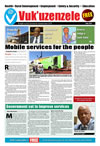
Translations:
Mobile services for the people
Mobile services for the people JoyPeople living in the rural parts of the country will now be able to register land claims closer to their homes.
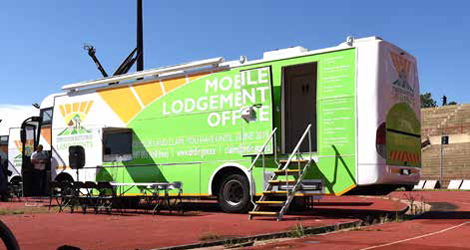 Rural Development and Land Reform Minister Gugile Nkwinti has made the process of a land claim easier by recently unveiling one of the four mobile buses at the Parliamentary precinct in Cape Town.
Rural Development and Land Reform Minister Gugile Nkwinti has made the process of a land claim easier by recently unveiling one of the four mobile buses at the Parliamentary precinct in Cape Town.
“You must remember that during the first window, there was no campaigning by government. In other words, taking the policy and opportunity to where people are did not happen.
“The result is that people in deep rural areas and even those in small and rural townships, who could not afford to go where the [lodgement] offices were, missed out on the opportunity.
“Now we have the mobile buses and the smaller trucks to go out there, talk to people and to basically campaign to tell them there is an opportunity to claim.
“So this is taking services to the people rather than inviting people to come to the office,” he said.
The unveiling of the mobile units comes after President Jacob Zuma approved the Restitution Amendment Act into law on 30 June 2014, and in the process re-opened the restitution process for a further period of five years to give those that did not lodge their claims in the first window an opportunity to do so.
During the first window – which ended on 31 December 1998 – the Commission on Restitution of Land Rights received 80 000 land claims.
When he recently addressed the House of Traditional Leaders in Parliament, the President told traditional leaders that they needed to organise themselves in order to assist people to be successful with their land claims.
It is estimated that 7.5 million people were alienated from their land after the 1913 Land Act was signed into law.
The previous round of claims was done between 1994 and 1998.
Three other buses will be launched in other provinces – the Eastern Cape, Free State and the North West.
The launch of the mobile offices follows the opening of 14 lodgement offices across nine provinces.
Minister Nkwinti also said the mobile offices were specifically equipped vehicles fitted with technology to enable the processing of applications for land claims on site.
The Minister said between July 2014 and 8 April 2015, 54 439 claims had been received.
The mobile units are fitted with the technology required to capture the claims on site – including computers and printers.
The bus is also fitted with an electronic ramp that can elevate persons with disabilities from the ground into the mobile office.
The trucks have already been deployed to Qwaqwa, Phuthaditjhaba in the Free State, Eastern Cape and Gauteng, and will move around to different areas.
One mobile office will proceed to North West in August and remain there until March 2016.
A full schedule of where the busses will go, including areas and times, will be communicated to members of the community by the department and the schedule is already available at the department’s 14 lodgement offices, regional offices or on the website.
Two trucks will go into areas where the mobile offices will be deployed to prepare claimants thoroughly.
This will be a process of ensuring that they have everything they need to lodge a valid claim, from the identity documents or information of the persons or relatives they may be claiming on behalf of, to ensure that their claims are not disqualified due to a lack of information.
The Minister said lodging a claim is a free government service and that qualifying individuals have until 30 June 2019 to lodge a claim.
“We are aware that there are people who are going around taking money from vulnerable members of our society with the promise to lodge land claims on their behalf.
“The message to our people is that you do not need to pay money to lodge a land claim.
“Claims can only be lodged at any of our 14 official lodgement sites across the country or at the mobile lodgement offices where professionally trained staff will be on-hand to assist you,” he said.
Government set to improve services
Government set to improve services JoyMinister in the Presidency for Planning, Monitoring and Evaluation, Jeff Radebe, said his department will work with Statistics South Africa (Stats SA) to ensure that statistics are used to improve the performance of government departments.
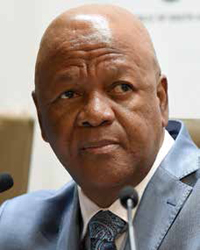 Speaking in Cape Town recently, Minister Radebe said many departments do not yet have the correct information management processes and systems in place to generate reliable data. However, he said the Department of Planning, Monitoring and Evaluation (DPME) is working hard to deal with this challenge.
Speaking in Cape Town recently, Minister Radebe said many departments do not yet have the correct information management processes and systems in place to generate reliable data. However, he said the Department of Planning, Monitoring and Evaluation (DPME) is working hard to deal with this challenge.
He added that one of the strategic priorities of the DPME is to test the impact of government programmes on society at large.
Minister Radebe said the DPME has a total of 39 evaluations completed, covering around R50 billion of government expenditure.
He said many evaluations have registered major impact even before they were made public. As a result, major improvements in the effectiveness of government programmes should be seen.
“We are in the process of launching a call for evaluations for 2016/17. During 2014/15, six evaluation reports were completed and submitted to Cabinet. We aim to initiate at least eight evaluations during the current financial year,” he said.
Basic education
Minister Radebe added that the first completed evaluations were making a big difference, referring specifically to the first evaluation on Early Childhood Development (ECD), which had resulted in a new ECD policy being developed and gazetted in March 2015.
“Among others, the focus will be on improving the quality of the Grade R curriculum to maximise its impact on poor children and in poorly performing provinces and strengthening the training and development of Grade R teachers.”
He said the evaluation of Grade R showed the importance of improving the quality of education provision and not just growing coverage.
Trade and investment
An evaluation of the Business Process Outsourcing Scheme of the Department of Trade and Industry (dti) was done to test whether the Business Process Services (BPS) Incentive Programme offered by the dti was creating jobs and increasing foreign direct investment.
“Key findings indicate that since the start of the incentive scheme, over 9 000 jobs have been created and that the BPS sector is a key sector for attracting investment and creating new jobs, especially in the 18 – 35 age group, where job creation for young people is most needed,” said the Minister.
National and provincial departments
The DPME has introduced a number of tools to encourage and instill monitoring and evaluation practices within the public service.
He added that the department had introduced the Management Performance Assessment Tool (MPAT) as a way to focus on monitoring management practices within national and provincial departments.
“As at September 2014, all national and provincial departments participated in the assessment of management practices undertaken by the DPME.
“The preliminary results indicated that 29 performance areas out of the 33 areas measured have shown an improvement in the scores, in spite of raising the bar in some of the standards and putting more focus on content in the moderation process.”
Presidential hotline
With regards to the Presidential Hotline, Minister Radebe said government continued to provide a service for the public to lodge their queries and complaints.
“Every year, we are able to process about 20 000 new complaints and queries. To date, we have recorded 207 000 complaints and queries at the hotline. Thirty-five percent are general queries and 65 per cent are complaints.
“I can report that for all complaints and queries we received, 94 per cent are recorded as resolved and 6 per cent remain to be resolved.”
Paying service providers on time
Minister Radebe said paying service providers on time was one of the areas on which the DPME did an analysis of national departments between 2013 and 2014. The analysis showed that there had been an improvement in the average number of invoices paid within 30 days.
He added that provincial departments showed a small improvement of 5 per cent in the average number of invoices paid within 30 days.
“Provinces reported 241 332 invoices worth R13.4 billion, which were paid after 30 days and 356 079 invoices worth R21.8 billion, older than 30 days, which were not paid.
“This is a 52 per cent regression in the average number of invoices that are older than 30 days, which have not been paid,” said the Minister.
He said national departments reported 155 572 invoices worth R3.8 billion, which were paid after 30 days. However, at the same time, 62 887 invoices older than 30 days - worth R2.1 billion - had not been paid.
Minister Radebe said the payment of suppliers within 30 days was still a major challenge, with major impact on small businesses, which also contributes to growing the economy and creating employment.
“We have thus undertaken to establish a special unit to monitor the 30-day payment rigorously and unlock bottlenecks,” he added.
Young people empower each other
Young people empower each other JoyEmmanuel Mogale, 23, is a young person who finds joy in empowering others.
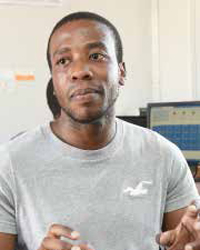 Every week he tutors high school pupils at the Kaalfontein Secondary School in Tembisa, Gauteng.
Every week he tutors high school pupils at the Kaalfontein Secondary School in Tembisa, Gauteng.
Mogale is a volunteer for a non-profit organisation known as IkamvaYouth, which gives learners from disadvantaged communities the knowledge, skills, networks and resources they need to access tertiary education or employment opportunities once they matriculate.
“The reason why I come here to tutor young people is because when I was in matric, someone tutored me and believed in me through IkamvaYouth. If I could see majority of these students get good marks and bursaries for university, I will be very happy.
“In this community young people have very limited opportunities to succeed due to economic conditions at home. I want to see a progressive community through education,” said Mogale.
It is a subject that is close to Mogale’s heart. After completing matric in 2013, the Ikamva- Youth organisation helped Mogale get a Makro learnership.
“Makro offered us a learnership to work for them and at the same time study at the University of South Africa towards a BCom degree in Business Management. Once we have finished this degree we will continue to work for the company.
“If it was not for IkamvaYouth I would not have received this information. I have them to thank,” he said.
Mogale tutors English, Physical Science, Sepedi, Geography and Life Orientation.
“I really love volunteering. It gives me a sense of joy that as a young person I am able to empower other young people and give back to the community.”
IkamvaYouth was established in 2003 and formally registered in 2004. The organisation has branches in Khayelitsha, Nyanga and Masiphumelele in the Western Cape, Ivory Park in Gauteng, the greater Cato Manor area and Molweni in KwaZulu-Natal.
Tutoring takes place in the afternoons after school, on Saturday mornings and during school holidays.
Juliet Moseamedi, 18, a Grade 11 pupil at Kaalfontein Secondary who wants to venture into biomedical studies after matric, says that since joining IkamvaYouth her studies have improved.
“Since I live in a township, every day after school I would just sit with my friends and do nothing. This is the norm for young people in my area. There was no motivation to do my school work and I did not see it as a priority.”
“When I came to Ikamva at the beginning of the year I was motivated to focus on my school work and it’s now bearing fruit. My marks are improving and also the level of understanding of my school work has improved,” said Moseamedi.
According to Clemence Msindo, the Branch Co-ordinator of IkamvaYouth in the Gauteng Region, learners enrol at IkamvaYouth when they are in Grades 11 and 12.
“In 2014, we had 38 matrics joining Ikamva- Youth and we had an 87 per cent pass rate; in 2013 we had a 100 per cent pass rate.”
More than half of the volunteers at longerestablished branches are ex-learners and over 80 per cent of the Khayelitsha management committee is made up of former beneficiaries.
In 2012, IkamvaYouth accommodated 743 learners across the seven branches.
Msindo says the organisation also gives career guidance, which is open to the community and provides education on HIV and AIDS, and mentorship.
“A tutor is allocated five learners to assist with their homework. This is to ensure that learners get the necessary attention.”
Ikamva is also open to anyone who would like to volunteer.
Those who would like to volunteer can visit: www.ikamvayouth.org.za for more information.
Creating opportunities for SA youth
Creating opportunities for SA youth JoyThe youth of South Africa must follow the example of the Class of ’76 and become builders of the country by aiming to be entrepreneurs who will play an active role in the economy.
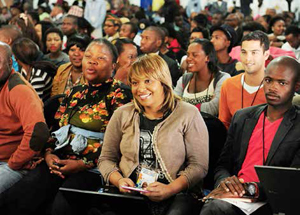 This is according to National Youth Development Agency (NYDA) CEO Khathutshelo Ramukumba, whose comments come at a time when government is finalising the National Youth Policy 2015-2020 (NYP 2020) that will play an important role in developing the country’s youth.
This is according to National Youth Development Agency (NYDA) CEO Khathutshelo Ramukumba, whose comments come at a time when government is finalising the National Youth Policy 2015-2020 (NYP 2020) that will play an important role in developing the country’s youth.
The NYP 2020, crafted together with young people from across the country, is expected to help shape the youth into active and productive citizens and also reposition the NYDA to make it more effective in dealing with youth matters.
The policy focuses on four key areas: economic transformation and participation, education, skills development and second chances, health care and combating substance abuse and nation building, social cohesion and active citizenry. According to Statistics South Africa, the youth make up more than 40 per cent of the population and 36 per cent of them are unemployed.
The NYP 2020 will help to deal with this challenge through youth development programmes that respond to the needs of the youth – programmes that allow young people to take charge of their own future.
NYDA CEO Ramukumba told Vuk’uzenzele that the NYP 2020 was good news for young people as it would help them to take their rightful place in the economy.
“I think the challenge that young people should take up today as their own challenge or defining moment is the struggle for economic transformation,” he said.
In June 1976, students from several schools were brutally executed by the apartheid regime when security police opened fire at unarmed learners who marched the streets of Soweto against Bantu Education, which compelled teachers, amongst other things, to use Afrikaans as a medium for tutoring in several subjects.
A picture showing the lifeless body of Hector Peterson, a young boy from the Morris Isaacson Primary School – shot by well-known photographer Sam Nzima – sent shock waves around the world.
Ramukumba said compared to that group of young people, today’s generation was more fortunate because more of them were educated and had access to opportunities to develop themselves.
“My personal take is that 21 years into democracy, a black child or an African child cannot be going to school to get education to get employment only.
“A mind-set of an African child must be one that says entrepreneurship is an alternative to employment so that they are able to be employers, they are able to be owners of the economy of their own country and that they are able to be builders of their own country.
“That to me is a struggle that young people of today must take up as their own struggle in order to achieve economic emancipation in their lifetime,” he said.
Youth policy under the microscope
The cosultations with young people gave young people a chance to not only make inputs into the policy, but it was also an opportunity for young people to take stock of progress made in implementing the commitment of the NYP 2009-2014.
“So it gave us an opportunity to say what have we prioritised in the last five years and have we achieved what we committed ourselves to but equally, an assessment of whether the material conditions of all young people have changed since then.
“If the material conditions of young people have not changed, then we need to come up with new solutions for addressing the challenges and for creating an enabling environment,” he added.
Ramukumba stressed the need to create an environment that would encourage youth development.
“In my view, an environment should be created for those who want to go to school to be able to go to school. Equally, those who for one reason or the other, fail to obtain their matric, must be provided with an opportunity to get a second chance so that we don’t write off their future.
“Those young people who have fallen off the education system and don’t have the education to be able to gain meaningful employment or skills to offer to the job market must be given an opportunity to gain skills, expertise or trade that they can offer to the job market.
“Beyond that, for the skills that they may have, support must be provided for them to go into entrepreneurship so that they can be able to participate in the economy, whether they chose to work or start their own business,” he said.
New jobs plan in the pipeline
Ramukumba added that a panel of experts had been appointed to look into all sectors of the economy to see which industries can absorb young people into the jobs market. These industries include youth development across all government spheres, the private sector, non-government organisations (NGO) and community-based organisations.
The panel will draft a plan that would look at the challenges and growth targets in the National Development Plan (NDP) – government’s vision and policy framework to develop the country by 2030 – to see which existing programmes can help young people get jobs.
“This employment plan will practically say which projects should be run – informed by the need to grow the economy as we understand it from the NDP between now and 2030 and then say which areas or which industries must be focussed on to create more employment for young people,” he said.
The panel of experts consists of professors from various universities as well as officials from Statistics SA and the Council for Scientific and Industrial Research (CSIR).
Ramukumba said that the NYDA had, through all of its programmes, helped with youth development.
“Statistics show that of the businesses that are registered with the Companies and Intellectual Property Commission (CIPC), only 30 per cent of them are able to sustain themselves beyond a period of 12 months. “We have been offering the National Youth Grant programme for two years and over this period, we have conducted a review of those businesses that were funded through the scheme.
“Our research shows that 54 per cent of businesses that were funded through our grant programme have been able to survive beyond 12 months,” he added.
For more information on the National Youth Policy 2015 - 2020 visit: www.gov.za
Building the soul of our nation
Building the soul of our nation JoyIn the course of my duty to the nation, I am very privileged to see just about every corner of our beautiful country.
My visits to communities all over South Africa always create mixed feelings.
There are places where the scars of apartheid still run deep – in the form of children in rural villages walking long distances to school, or the ravages of alcohol abuse among farm workers in some areas.
The scars are there in the form of men and women idling their time away on street corners or in shebeens, because their skills and level of education don’t allow them to participate fully in South Africa’s economy.
And they’re there in the back streets of townships where gangs terrorise residents and social ills such as substance abuse, teenage pregnancy and domestic violence are a way of life for many.
And yet, I often visit these communities because government is working with citizens to improve living conditions and we are trying to make a difference, or have already made a difference in such places.
This is when I see new schools, clinics and traffic lights going up. This is when I see women’s cooperatives that feed families and produce goods for export to other countries. This is when I meet medical staff who work flat-out in remote corners of the country to care for the sick, or police officers who put their lives on the line to confront brutal criminals.
This is also when I see new roads where there once were gravel tracks; brand-new universities and hospitals in places from which people used to travel dozens of kilometres to access education or health services; factories and other industrial plants where people used to be jobless and hopeless.
Seeing this rate and level of development around our country gives me the inspiration to serve the people of South Africa, and gives me the confidence that we will never fail in moving South Africa forward.
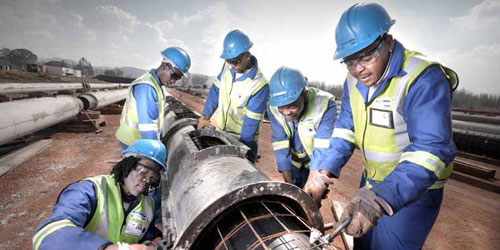 South Africa is one big building site where cranes and crews in our major cities are helping our economy to grow, while tractors, trenches and expanded public works in our rural areas are bringing modern infrastructure and social opportunities to citizens.
South Africa is one big building site where cranes and crews in our major cities are helping our economy to grow, while tractors, trenches and expanded public works in our rural areas are bringing modern infrastructure and social opportunities to citizens.
But our nation’s growth is not just about what we do with our hands.
More importantly, it’s about what we do with our hearts and minds.
News headlines do not always tell us the full story about South Africa. But they do tell us important – and sometimes disturbing – stories that challenge us to work as hard on our behaviour as we do on our building sites.
Recently, these stories have included a reported incident where children at an Eastern Cape school refused to eat their meals because cooks in the school kitchen urinated in buckets used for food. The women who prepared the food said their walk to bathrooms off the school premises was too long.
On a different subject altogether, there was the distribution of shocking video footage showing Witbank community members refusing to help a man who had been set alight as punishment for stealing copper wire at an electric sub-station.
Media reported that the man was seen pleading with people to call an ambulance while some of his skin was hanging off his body. Instead, people gathered around him only to have a look at his suffering.
The man walked to a nearby clinic and made it to hospital, but died after a few hours.
Around the same time, it was reported from the Free State that a 47-year-old businessman and his 16-year-old son had been arrested in connection with an incident in which the man’s son had allegedly humiliated and traumatised a 57-year-old security guard by having a dog commit a sexual act against the guard.
Some of these events are unthinkable to most law-abiding, peace-loving South Africans, but it is a reality that such horrible acts are part of our social fabric.
Just a few days ago, we celebrated Freedom Day; a day that reminds us of the road we have travelled to a better, post-apartheid South Africa, and a day that focuses our attention on the Bill of Rights in our Constitution that is, in a way, the terms and conditions of our freedom. With regard to equality, the Bill of Rights says no-one can be discriminated against.
 On human dignity, the Bill of Rights says everyone has a basic human dignity which must be respected.
On human dignity, the Bill of Rights says everyone has a basic human dignity which must be respected.
The Bill of Rights declares that everyone has the right to life, and that everyone has the right not to be treated or punished in a cruel, inhuman or degrading way.
The Bill of Rights also says that every child has the right to basic nutrition, shelter, basic health care services and social services, and to be protected from maltreatment, neglect, abuse or degradation.
It is sad that many South Africans live their lives – and damage the lives of others – as if these rights do not exist.
It is also sad that when people commit violations of the Bill of Rights, they are excused or protected by members of their families or communities, who stop the police from investigating or our social agencies from intervening.
This goes against our best efforts to move South Africa forward.
We need South Africans not just to check how much the country is changing by looking at our physical development, but to help the country change for the better by examining and improving their behaviour and living up to their responsibilities as citizens.
No amount of new houses, roads, factories or power stations will advance our development as much as the spirit and practice of ubuntu and good citizenship.
Just more than eight years ago, the African National Congress produced a discussion document entitled The RDP of the Soul that set out the way for transforming our country through the reconstruction and development of the nation's spirit.
The document stated that it was “the spirit of South Africans that drives our political, economic and social processes”.
It said: “All religions agree on the great spiritual truths which drive humanity, and we need to accept this agreement as the launch pad for new development. We hold the same values in common whether it is love, joy, or peace; honesty, justice or integrity; generosity, responsibility or loyalty; and these arise from the experience of ubuntu.”
Eight years on, the same issues confront us in 2015. Our cranes, hard hats, jobs and spending power will mean nothing if we don’t improve what we think, feel and do deep inside ourselves.
Building a better South Africa starts on the inside; let’s get to work.
Jacob G Zuma
President of the Republic of South Africa
New science labs inspire Mahikeng learners
New science labs inspire Mahikeng learners JoyNew science laboratories are set to make teaching and learning science at the Boithaopo Secondary School in Mahikeng, North West, more exciting.
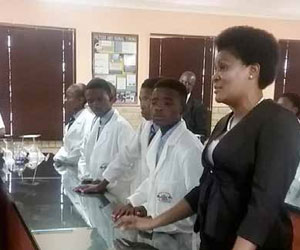 Wearing lab coats and guided by trained technicians, the learners wasted no time in trying out their new laboratories.
Wearing lab coats and guided by trained technicians, the learners wasted no time in trying out their new laboratories.
“Wearing a lab coat and being in a science lab made me feel like I'm a professional scientist. I am excited to start experimenting with my fellow pupils. I hope the labs will make it easier for us learn and understand Maths and Science,” said Lesedi Gontse, a Grade 11 learner at the school.
The new laboratory will enable learners to explore and try scientific concepts and formulas using purpose-designed technology and tools.
Speaking at the launch of the new labs, Deputy Minister of Basic Education Enver Surty said: “This is part of our endeavour to promote Mathematical Science and technology in our schools, particularly in rural schools.
“The launch of the laboratories is important because it provides resources to our learners, equipping them with laboratories despite living in rural communities.”
The Deputy Minister added that the laboratories would improve teacher development.
“The educators using the laboratories will know how to use the technology, equipment and resources available. It also convinces learners that Mathematics and Science are interesting through experiencing science practically,” he said.
The new laboratories are as a result of an Industrial Development Corporation (IDC) initiative, in partnership with Adopt-a-School.
Since formally adopting it in 2012, the IDC has invested R4.5 million in Boithaopo Secondary School and the rural community of Kraaipan. Because of the investment, the school has received specialised science equipment, teacher development programmes and supplementary programmes for Grade 10 and 11 learners.
The school’s water reticulation system has been upgraded and two new life science and physical science laboratories have been provided. The IDC adopted the school to help improve the quality of teaching, boost the number of learners taking Science and Pure Maths, and raise the school’s overall matric results. All teachers have been trained to manage the laboratories and use the equipment as a teaching aid.
“The journey does not end with this launch. The IDC will continue to partner with the school to ensure the facilities are optimally utilised and to ensure the facilities are impacting on the learners' results going forward,” said the IDC’s Divisional Executive Josephine Gaveni.
Norman Phiri, principal of Boithaopo Secondary School, described the opening of the laboratories as a key milestone for the school, and called on the learners to rise to the challenge.
“The school and the community are thankful and very happy. We are inspired and are aiming for level seven results. Our Maths and Science pupils no longer have any excuse not to improve their marks,” he said.
State-of-the-art school will improve education
State-of-the-art school will improve education JoyLearners living in Mtubatuba, KwaZulu-Natal (KZN), no longer have to travel long distances to get to school or call rented tents a classroom.
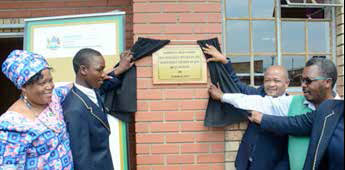 Speaking at the official opening of Nkombose High School Neliswa Nkonyeni, the KZN MEC for Education, said that the department had spent R1.2 billion on building new schools and refurbishing existing ones this financial year.
Speaking at the official opening of Nkombose High School Neliswa Nkonyeni, the KZN MEC for Education, said that the department had spent R1.2 billion on building new schools and refurbishing existing ones this financial year.
The newly built state-of-the-art Nkombose High School cost the department R26 million and accommodates over 1 000 learners from Grade 8 to 12.
Nonkumbulo Mthethwa, a Grade 10 learner at the school, said she is happy to be able to learn at a school close to home. “Now I don’t cross a river to go to school like I used to before. When the river is flooded I don’t stress about how I am going to get to school,” she said.
Grade 11 learner, Musawenkosi Mbonambi, said he considered himself very privileged to be in this school.
“Many schools in the area do not have computer labs. Learners have to spend money at internet cafes when they have to do research. Those who come from poor families end up not doing their school work because parents don’t have money to give them to be able to use internet cafes,” he said.
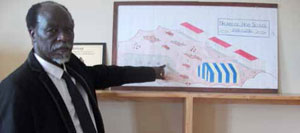 The new school has 27 classrooms, a media centre, two computer labs, a science lab, an administration block and a sick room.
The new school has 27 classrooms, a media centre, two computer labs, a science lab, an administration block and a sick room.
Principal Phiwayinkosi Ngubane said he had no words to express his happiness at receiving the beautiful school.
“What we see here really shows that our government is investing in education to shape our children’s future. Our government is making sure that the right to education, entrenched in the Freedom Charter, is fulfilled for our children and we are happy to see that,” he said.
School Governing Body Chairperson Bheki Gumede said they would make sure that the school is not vandalised. He said the school belonged to all of them and they would make sure that they protect it in every way it possible.
Community colleges for quality education
Community colleges for quality education JoyYoung people and adults who did not finish their schooling will have a chance to do so at one of the newly established community colleges across the country.
The new colleges will be established to cater mainly for youth and adults who do not qualify to study at Technical and Vocational Education and Training (TVET) colleges and universities because they did not finish school. Minister of Higher Education and Training Blade Nzimande said the community colleges would be modelled by grouping together clusters of adult learning centres, with government strengthening their infrastructure, staffing and programmes.
“They will be provided with adequate infrastructure and a critical mass of full-time staff, and will be expanded by adding new campuses where this is necessitated by increasing enrolments and programmes,” says the White Paper for Post School Education and Training.
According to the Minister, the community colleges will cater for a population that is not included in the post-schooling environment.
Currently, South Africa’s Public Adult Learning Centres cater for about 300 000 individuals which, according to Minister Nzimande, is not enough.
Speaking at the welcoming ceremony for about 38 000 new staff members that will work at the colleges across the country, Minister Nzimande said technical and vocational education and training would primarily target youth and adults who had not completed school or never attended school.
The new institutions will not operate in isolation.
“Although they will be public colleges, they will be able to enter into partnerships with community-owned or private institutions such as church-run or other education and training centres,” said Minister Nzimande.
They will build on the current offerings of the Public Adult Learning Centres in order to grow vocational and skills-development programmes and non-formal programmes.
Formal programmes will include the General Education and Training Certificate and Senior Certificate programmes currently offered, as well as the proposed new National Senior Certificate for Adults and occupational programmes funded by Sector Education and Training Authorities or the National Skills Fund.
“The community colleges should draw on the strengths of the non-formal sector – particularly its community responsiveness and its focus on citizen and social education – in order to strengthen and expand popular citizen and community education,” according to the White Paper.
For more information visit: www.dhet.gov.za
A healthier system for all
A healthier system for all JoyHealth Minister, Dr Aaron Motsoaledi, says government needs to change its budget strategy to strengthen the public health system.
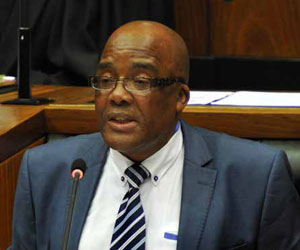 The Minister said the strategy would also include prioritising the prevention of disease and promoting health to ensure that people get good quality health care.
The Minister said the strategy would also include prioritising the prevention of disease and promoting health to ensure that people get good quality health care.
The Minister said this when tabling his department’s Budget Vote in Parliament recently.
The Budget Vote is a speech delivered by the Minister that outlines the plans, highlights and priorities of their department.
If the country and other African states are to take the continent forward, public health systems must be strengthened to help the health sector to prevent and manage disease outbreaks like Ebola, meningitis, TB, HIV and AIDS and polio, for example.
It was for this reason that at a recent World Health Organisation conference in Benin, Ministers of health took a decision that instead of having vertical programmes (separate budgets to fight malaria, polio, HIV and AIDS, TB, among others) governments should invest in strengthening public health systems.
“We believe that what will help Africa are strong health systems which in turn will withstand whichever outbreak emerges because… we actually do not know what will follow next.
“Yesterday it was HIV and AIDS, today it is Ebola and TB and tomorrow is what? We do not know but we believe that some other outbreak is unfortunately in the pipeline,” said the Minister.
He added that the outbreak of diseases that he referred to could be caused by climate change, an increasing violation of humankind in the habitat of other species in search of food, water and shelter, as well as the ever-increasing emergence of the post antibiotic era.
The Minister said that during the 2014/15 financial year, his department has been busy with plans to strengthen the public health system.
“This will include preventing disease, promoting health and making sure that our people get good quality health care.
“This is our mandate and this we shall pursue with vigour”.
Prevention is better than cure
Minister Motsoaledi said curing diseases is usually regarded as a scientific achievement, while prevention is not given the same stature.
He said this was the reason why in the public health sector, any negative event that happened was immediately regarded as a collapse of the health system.
“No matter what detractors will say, we shall not abandon or weaken the preventative aspect of the health system, on the contrary, it is going to be the foundation of our programme of health system strengthening.”
The department introduced new vaccines in 2009 in its routine immunisation programme, including the pneumococcal conjugate vaccine and the rotavirus vaccine.
Pneumococcal diseases like meningitis and severe pneumonia are regarded as very dangerous and in South Africa and around the world, is the number two killer after HIV and Aids to children under the age of five.
The Minister said prevention vaccines have led to the department decreasing these diseases by 70 per cent.
Prostate cancer: You can beat it
Prostate cancer: You can beat it JoyOne in every 23 South African men is affected by prostate cancer. Although the disease affects many men, it does not get enough attention.
Dr Stan Moloabi, Executive Healthcare Manager at the Government Employees Medical Scheme (GEMS) believes that more has to be done to educate South African men about the disease – especially since if the disease is picked up early, it can be treated.
“Many South African men know relatively little about prostate and testicular cancers,” he says.
Treatment of the disease has improved over the years, and the sooner it is detected the higher the patient’s chances of survival.
Prostate cancer occurs in a man’s prostate — a small walnut-shaped gland that forms part of the male reproductive system. Prostate cancer occurs when abnormal cells grow in the prostate gland.
Who can get prostate cancer?
Prostate cancer affects men of all races and ages, although men over the age of 50 are at a much higher risk of developing it than younger men are.
“In general, the older the individual the greater their risk of developing the disease,” notes Dr Moloabi.
Men who are over the age of 40 should visit their doctor for tests for prostate cancer once every two years. Men who are over the age of 50 should be screened once a year, he advises.
Symptoms of prostate cancer |
|||
In many cases prostate cancer does not have any symptoms. This is one of the reasons why it is important for men to be screened by their family doctor. Men should look out for the following:
|
Treatment of prostate cancer
The treatment of the disease depends on how far it has progressed, what type of cancer it is and the health of the patient.
There are a number of treatment options available for prostate cancer, including surgery, radiation therapy, watchful waiting or hormone therapy – it all depends on how the cancer develops.
How to prevent prostate cancer
Living a healthy lifestyle can prevent many medical conditions that affect men including prostate cancer.
“Eat a healthy diet, get some exercise, quit smoking and heavy drinking to ensure that you stay healthy,” advises Dr Moloabi.
He adds an annual medical check up, especially if you have a family history of cancer, can help save your life.
Epilepsy: what you need to know
Epilepsy: what you need to know JoyEpilepsy, which is also known as a seizure disorder, affects hundreds of thousands of people of all races and backgrounds in South Africa.
A seizure disorder is a common condition that affects the brain and nervous system. An estimated one in 100 South Africans will suffer from epilepsy at some point in their lives.
Dr Stan Moloabi, Executive Healthcare Manager at the Government Employees Medical Scheme says everyone should learn about this medical condition and what to do in the event that someone they know has a seizure.
“Many of us are likely to come across someone who is epileptic, or having a seizure, at some point in our lives,” he adds.
“Seizures may have many different causes and anyone could suffer one at some point in their lives. South Africans should keep this in mind before judging those who suffer a seizure or from epilepsy.”
A seizure is a rush of electrical activity in the brain that affects how a person feels or acts for a time.
It can take many different forms and can affect different people in different ways. Some seizures are mild; the person may just feel absent for a second or two and not even notice that they have had a seizure.
In other, more major seizures, the individual may lose consciousness, their body may become rigid or stiff and they may make fast jerking movements.
Epilepsy can be managed and controlled with medicines or other medical treatments in the great majority of cases.
Causes of seizures include:
- Epilepsy may be inherited.
- Infections of the brain such as meningitis and encephalitis.
- Tumours.
- Chemical imbalances in the brain caused by conditions such as low blood sugar and diabetes.
- Withdrawal from alcohol.
- Use of certain street drugs.
How to handle a person having a seizure |
|||
The following are some steps that should be taken when responding to a person having a seizure:
|
“Remember that the great majority of epileptics respond well to treatment, so anyone who is suffering from the condition should be encouraged to visit their doctor,” adds Dr Moloabi.
Taking back the streets
Taking back the streets JoyGovernment’s new multidisciplinary operation that aims to crack down on crime and keep people safe is yielding good results.
Operation Fiela/Reclaim brings together various state entities to ensure that there is law and order on the streets of South Africa.
The operation deals with issues of criminality, including illegal weapons, drug dens, prostitution rings and other illegal activities. As part of the operation, law enforcement agencies have been sent to different parts of the country to restore peace and stability.
“As a country, we are concerned about the safety and well-being of all those who live and work here and we want to ensure that both South Africans, and the foreign nationals who live in our midst, are and feel safe,” said Minister in The Presidency responsible for Planning, Monitoring and Evaluation, Jeff Radebe.
Minister Radebe was speaking at a press briefing reporting back on the work of the Inter-Ministerial Committee (IMC) on Migration recently.
He added that the operation was not targeting law-abiding citizens or foreign nationals.
“Government will never authorise actions that are contrary to our Constitution and the laws of the country,” Minister Radebe said.
He said the operations will continue to target areas, buildings and spaces which are known to be frequented by criminals.
In the next weeks and months, government will speed-up its efforts to take back public buildings that have been hijacked either by foreign nationals or South Africans.
Efforts will also be made to rid townships and villages of drugs such as nyaope, wunga and tik.
“We are determined to take back the communities from criminals and to re-assert the authority of the state,” Minister Radebe added.
He said a total of 3 914 people were arrested for various crimes such as human trafficking, possession of explosives, drug possession, murder, robbery, rape as well as the possession of illegal firearms, housebreaking, and theft.
“It needs to be noted that while 1 650 undocumented migrants were arrested, 2 264 South African citizens were arrested in connection with various crimes,” said Minister Radebe.
As part of Operation-Fiela, government will ensure that informal businesses are properly licensed and local government by-laws are effectively implemented.
“We are however concerned about those, both South African and foreigners, who illegally run businesses that are in some cases unlicensed, as well as those who engage in collusion, evade taxes, import counterfeit goods and conduct illegal business practices to the detriment of our economy,” he said.
The Minister said security agencies would continue to work around the clock to protect both foreign nationals and South African citizens against any attacks.
“We are maintaining law and order around the country. We believe the attacks against foreign nationals have been stopped because of the work done by government and civil society organisations in mobilising communities to denounce the violence, and ensure peace and harmony amongst all who reside in our country,” he added.
Mediators to ease court roll
Mediators to ease court roll JoyThe new Court Mediation Rules will help resolve disputes faster and settle matters out of court.
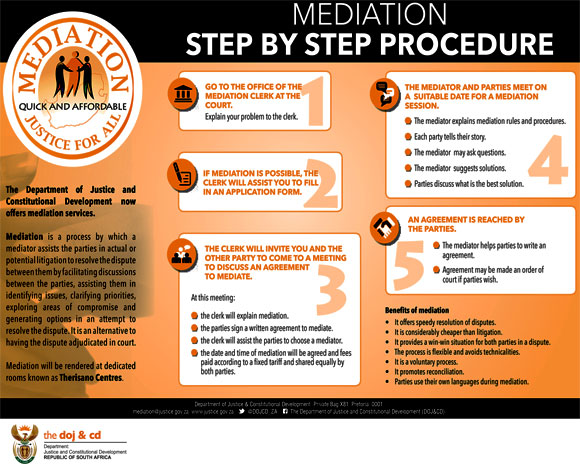 Mediation is a process whereby a mediator helps affected parties, in actual or potential legal action, to resolve a dispute between them. This is an alternative to having a dispute resolved in a court of law.
Mediation is a process whereby a mediator helps affected parties, in actual or potential legal action, to resolve a dispute between them. This is an alternative to having a dispute resolved in a court of law.
The Court Annexed Mediation was launched recently in the North West by the Minister of Justice and Correctional Services, Michael Masutha, where 231 mediation clerks were appointed.
Mediation clerks facilitate discussions, help in identifying issues, clarify priorities, explore areas of compromise and generate options to help resolve a dispute.
According to the department, mediators will assist to bring down the number of civil and family law dispute backlog cases. On average, a case can take up to two-and-a-half years to finalise, whilst they could have been resolved out of court and saved each party costs.
Deputy Chief State Law Adviser, Advocate Jacob Skosana, said mediation is being piloted in 12 districts and regional magistrates’ courts, nine in Gauteng and three in the North West.
“You simply approach a mediation clerk in the civil section at a magistrate’s court, which has jurisdiction in respect of a dispute. A clerk will arrange for the parties to attend a meeting to determine whether their dispute should be submitted to the mediator or not,” explained Advocate Skosana.
He added that a mediation process had no court fees, but that a mediator is entitled to charge a certain fee, according to a fixed tariff.
“The parties contribute equally to this fee, which must be paid in court before the mediation process commences,” he said, adding that some mediators do act without charging a fee.
A mediator will be a person that the parties choose, with the help of a mediation clerk, from a panel of accredited mediators appointed by the Minister.
Chairperson of the Mediation Advisory Committee, Acting Judge Cassim Sardiwalla, said almost all disputes could be mediated.
“The most important requirement is that there must be a dispute. If a plaintiff is claiming money for work done and a defendant has no defence to the claim, but is simply not paying, then there is no dispute. If, on the other hand, a defendant is refusing to pay because the work was not properly done, there is a dispute,” he explained.
Mediation is appropriate for the resolution of disputes between parties who have or want to interact with each other in future.
Advocate Skosana said both parties have the right to be represented if they wish, but they are not forced to.
“Parties who are represented will be responsible for the fees to their legal practitioners,” he said.
Advocate Skosana added that parties could also request that a friend or family member be allowed to be present during mediation, to lend support.
The mediation process can take place at any time before a judgment has been made.
The court-annexed mediation rules also state that during the hearing of a matter, a judicial officer can enquire if it should be referred for mediation. The judicial officer can also give parties an opportunity to consider this, in consultation with a clerk or registrar.
*Mokgethwa Ngoepe works for the Department of Justice and Constitutional Development.
Mediator resolves fight speedily
Mediator resolves fight speedily Estelle GreeffElizabeth Saunders, 34, opened a case of harassment and sought a protection order against her aunt Irene van Niekerk, 52, at the Krugersdorp Magistrate’s Court.
They were both involved in a noble cause in their community in Krugersdorp, west of Johannesburg, by distributing food parcels to the needy and giving them clothing from their sponsors.
Things turned sour between them when rumours started that Elizabeth was selling some of the food parcels and clothing for personal gain. The remaining ones, she would allegedly give to some selected few youngsters and not to the community that was meant to benefit from it.
This rumour made Saunders very angry and she confronted Van Niekerk about them, resulting in a big fight between the two.
Following the fight, the two women stopped working together, and this affected the needy people they were helping in their community.
When they met with Mediator Terry Mphelo, they each presented their side of the story and she helped them to come to an agreement.
They first apologised to each other and reached an agreement within a few hours of the sitting.
The agreement was that they would continue working together to help the needy and that Saunders would keep all the records of the received goods and also records of when it was distributed and who received the goods.
Since their initial confrontation was mainly because of the rumours, they reached an agreement that they would no longer listen to the rumours and that they would work together closely instead.
Van Niekerk was very happy with the agreement.
“This is the best way to solve disputes because now my niece and I have resolved our issues speedily without having to go to court,” she said.
New watchdog for transport sector
New watchdog for transport sector JoyBudget Votes
A new transport sector watchdog will soon be established to address challenges faced by the sector.
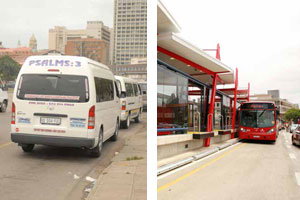 “We are in the process of establishing the Single Transport Economic Regulator in order to address the regulatory shortcomings across the transport sector. This will lead to better pricing and more efficient transport infrastructure and services,” Transport Minister Dipuo Peters said during her department's Budget Vote recently.
“We are in the process of establishing the Single Transport Economic Regulator in order to address the regulatory shortcomings across the transport sector. This will lead to better pricing and more efficient transport infrastructure and services,” Transport Minister Dipuo Peters said during her department's Budget Vote recently.
Minister Peters made the announcement as South Africa continues to look for ways to create funding models to maintain and build more roads to accommodate the increasing number of cars on the country’s roads.
More funding for South African National Roads Agency Limited (SANRAL)
Minister Peters said due to the ageing road network infrastructure, more investment is needed in the roads network with no highways built since 1986, with the exception of those that were built as part of toll projects.
“We will be targeting those parts of the network that are busiest, where even minor holdups can turn into major delays, especially on urban roads and highways like the N3, which is the busiest corridor in Africa.
Proposal to replace Road Accident Fund
The Minister said government is directly extending care to victims of road carnage, and that a Road Accident Benefit Scheme Bill would be formally introduced to make way for the establishment of a new administrator to replace the Roads Accident Fund.
She said the Bill, which has been published for public comment, proposes a new social security safety net scheme that is not fault-based.
“It will allow expanded access to much-needed benefits to road users including public and private transport passengers, widows, orphans and many other dependents previously and currently excluded by virtue of fault,” she said.
Review of taxi recapitalisation
The Minister also said that government would spend close to R2 million to review the taxi recapitilisation model.
“The department will be reviewing the taxi recapitalisation model to improve its effectiveness and affordability. Expenditure on the review is projected at R188.5 million over the medium term.”
Under the taxi recapitalisation programme, taxi operators are paid a sum of money to scrap their old vehicles and buy new ones.
She added that government would continue to work with the taxi industry to bring changes and improve service.
Home Affairs to provide quality services
Home Affairs to provide quality services JoyBudget Votes
Home Affairs Minister Malusi Gigaba has outlined a number of initiatives that will see his department improve service delivery.
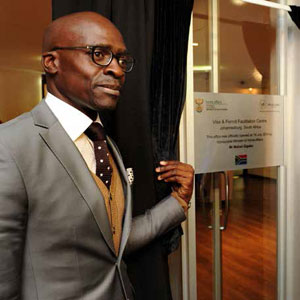 Speaking during his department's Budget Vote Minister Gigaba said as part of improving the overall services, the department will during the current financial year:
Speaking during his department's Budget Vote Minister Gigaba said as part of improving the overall services, the department will during the current financial year:
- Issue 2.2 million smart ID cards.
- Grow its footprint by placing Home Affairs kiosks at banks, which will allow the public to apply for ID smart cards and passports by appointment.
- Roll-out payment for Home Affairs services by debit or credit card to 140 smart ID card-capable offices.
- Begin to upgrade the Electronic Movement Control System at the country’s ports of entry to capture biometric data of all foreign nationals entering the Republic. • Introduce enabling legislation for the Border Management Agency (BMA) and pilot aspects of the BMA operating model at selected ports of entry.
- Work with National Treasury to develop an innovative funding model to revamp six key land ports of entry.
- Finalise a Green Paper on International Migration for public comment.
- Increase access to its Visa system by opening two new centres in China, to join the nine new centres that were already opened in India.
- Make it easier for foreign students with critical skills to remain in South Africa after graduation.
He added that his department was working on finalising legislation on the establishment of a Border Management Agency.
The agency aims to improve national security and public safety and to enable the efficient flow of legitimate travellers and goods. The announcement was made at a time when there were tensions between South Africans and foreign nationals in parts of the country.
The Minister noted that government had acted decisively to deal with the recent attacks on foreign nationals.
“As you know, we have acted decisively to deal with the unacceptable attacks against foreign nationals in January and April of this year, as we did in 2008,” he said.
The Minister was one of several ministers deployed by President Jacob Zuma to Kwa- Zulu-Natal to be on the ground and talk with members of the public and provincial authorities in a bid to restore calm and normality in the province.
“Our on-going work with the Inter-Ministerial Committee on International Migration, the establishment of a Border Management Agency and the policy review process will substantially improve our country’s management on international migration and address the underlying issues driving tensions on the issue of immigration,” he said.
Department moves to end the late registration of births
The Minister added his department was moving to end the late registration of child-births – a wide spread practice – by December 31, 2015.
As the department strives to clear the population register, the Minister said late registrations of birth could no longer be justified.
“From January 1, 2016, all births registered after 30 days will have to undergo a rigorous process to prove that the child really is a South African citizen.
“The process will be designed to ensure that no genuine South African is at risk of losing their citizenship,” he said.
Quality homes for all
Quality homes for all JoyBudget Votes
As government strives to deliver quality homes to all citizens, Human Settlements Minister Lindiwe Sisulu has called on beneficiaries to take care of their homes.
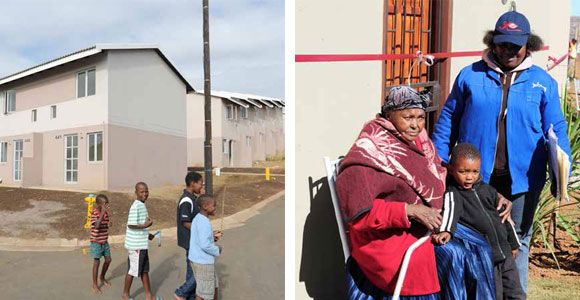 The Minister made the plea as part of her department’s Budget Vote proposals that were tabled in Parliament recently.
The Minister made the plea as part of her department’s Budget Vote proposals that were tabled in Parliament recently.
She said houses were valuable assets and that beneficiaries should take care of them.
“A beneficiary of a house has a responsibility to fix a broken window or door latch when it is broken.
“We are embarking on a nationwide consumer education to empower our people to understand the value of the houses they own, the importance of caring for it and most importantly, why they must not easily sell it to address short term challenges.
“In partnership with one of our entities, the Estate Affairs Agency Board, we will educate them on how the property market works,” she said.
The Minister added that beneficiaries should not sell their houses until they have lived in them for eight years.
She said the first buyer to the low-cost houses should be government, and that her department would regulate the sale of the houses to ensure the sale is legal, and that the seller is informed and able to make an informed decision.
"The department aims to build 1.5 million houses and create housing opportunities to accommodate a growing housing backlog."
“I would urge that beneficiaries of government’s free houses should carefully consider before selling. This is possibly the only asset they can bequeath their children."
Reducing the housing backlog
Minister Sisulu said that her department was working hard to reduce the housing waiting list backlog and that elderly citizens would be prioritised over young people because they have been waiting longer to get a house.
“Young people need to strive to educate themselves, get skills and access job markets in order to afford their own homes,” she said.
The department aims to build 1.5 million houses and create housing opportunities to accommodate a growing housing backlog.
The Minister said her department was exploring partnerships to ensure that this target is met.
“Following the Human Settlements Indaba last year, we signed a social contract with the Banking Association of South Africa.”
Houses to be built in mining towns
The Minister said her department would rollout decent housing to 22 mining towns in six provinces, as per President Jacob Zuma’s directive.
The President appointed an Inter-Ministerial Committee last year to focus on revitalising distressed mining towns.
“For the last financial year, more than 4 000 units were delivered, mainly in Mpumalanga and North West, which are the main pressure points.
“In the Marikana area, there are two human settlement projects being completed that will deliver over 500 units built on land donated by Lonmin.
“Anglo American has embarked on a project to provide more than 10 000 housing units,” she said.
Department to abolish hostels
Minister Sisulu also announced that those that have lived in hostels for years could qualify for a Breaking New Ground (BNG) house or the Community Residential Units Programme (CRU) subsidy.
A BRG is a programme where government does not only build houses but builds sustainable settlements that are habitable, and have services such as schools, and clinics, amongst others.
The CRU subsidy is a programme that aims to provide secure and stable residential low-cost rental opportunities for families and single persons.
“Together with the Mayors, we have agreed that the upgraded hostels would be bought by the SHRA and managed as social housing projects. This we will do in every town where we have upgraded hostels and hostel dwellers have not taken up residency. The message we want to send to hostel dwellers is that we have understood your concerns and responded to your pleas. We request that you allow us to put you up in temporary shelter while we build permanent units for you.”
She said preference would be given to under 40s who do not earn enough to buy a house.
Youth empowerment
The Minister also announced that her department had started the ‘One Learner One Estate Agency’ Youth Brigade programme, with the aim of placing interns with a registered estate agency for a period of 12 months.
The Minister said this would equip intern estate agents with the required property market experience while they obtain the necessary real estate qualification.
“The Estate Agency Affairs Board has so far received over 1 450 pledges from registered Estate Agencies and more than 7 500 CVs of potential candidates.
“Out of the project, by the end of the financial year we will have 10 000 young people working and getting trained as estate agents,” she added.
Increase in skills training
Increase in skills training JoyBudget Votes
Thousands of young people have received skills training through government’s labour market interventions over the past year.
Labour Minister Mildred Olifant announced this when she tabled her Budget Vote recently. She said one of the interventions – the Labour Activation Programme - which was funded through the Unemployment Insurance Fund (UIF), had made an impact in skills development.
“We targeted to train 2 000 UIF beneficiaries to prepare them for re-entry into the labour market, but instead, 3 117 workers were supported and 600 of these trainees were re-absorbed in real jobs.
“Five thousand one hundred and four (5 104) were supported through training offered by accredited Sector Education and Training Authorities and 450 aspiring entrepreneurs benefitted through tailored training programmes.
“Whilst the numbers may not be where we would want them, we are however very pleased with progress so far,” she said.
The Labour Activation Programme was launched to deal with the skills shortage faced by the country and to help the unemployed in both urban and rural areas to be marketable in the labour market.
Key priority areas
The Minister said some of the department’s priorities going forward would include:
- Speeding-up the finalisation of the Unemployment Insurance Amendment Bill.
- Improving the efficiency of the Compensation Fund.
- Fast-tracking the tabling of the proposed Compensation for Occupational Injuries and Diseases Amendment Bill and the Occupational Health and Safety Amendment Bill.
- Improving service delivery by rolling out the self-help kiosks.
- Continuing to build the information and communication technology capacity of the department.
- Reviewing minimum wages for the vulnerable sectors.
- Ramping up the department’s performance in managing workplace conflict and dispute resolution.
Making a difference through drug awareness
Making a difference through drug awareness JoyWhen Moses Letsoalo came back to South Africa after serving two years in Her Majesty’s Prison Wormwood Scrubs, in the United Kingdom, he was a changed man.
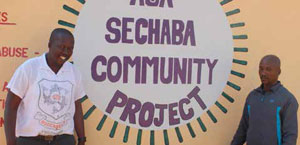 Letsoalo’s drug addiction had led him to become a drug mule, which resulted in him spending time in prison away from his family and country.
Letsoalo’s drug addiction had led him to become a drug mule, which resulted in him spending time in prison away from his family and country.
Today, he is a changed man and the founder of Aga Sechaba Community, which is funded by the Gauteng Department of Social Development and based in Ga-Rankuwa in Pretoria.
The organisation focuses on the awareness and education of the dangers of drugs, through campaigns, referrals and support.
Letsoalo now has 15 former offenders and addicts working as representatives of the organisation across Pretoria and Limpopo.
“Since October 2010, Aga Sechaba has rendered services to over 1 100 families and referred over 320 youth to rehabilitation services,” said Letsoalo.
The organisation provides rehabilitation and treatment programmes for alcohol and drug abusers and recreational opportunities, to ensure the prevention of future addiction.
According to the Gauteng Department of Social Development, there has been an increase in the number of young people using drugs and alcohol in the poorest urban areas.
Gauteng MEC for Social Development Faith Mazibuko said in her 2014 Budget Vote that during the 2014/2015 financial year, the department would increase funding to 57 substance abuse treatment centres, providing access to 102 777 service users.
Letsoalo’s organisation is one of the non-profit organisations supported by the department.
The MEC said that her department would also ensure that substance abuse treatment centres were properly registered and regulated to prevent the establishment of illegal drug rehabilitation centres.
The South African National Council on Alcoholism (Sanca) also raises awareness of the dangers of narcotics during Drug Awareness Week, which takes place from 24 to 28 June. Letsoalo is one of the people who has shown that there is life after drugs.
According to Letsoalo, recovering drug addicts need support from community members in order to succeed.
“Our young people feel hopeless with no jobs or education opportunities, which makes them venture into drugs. Education plays a big role for the community and parents if they are to understand what it means to be a drug addict, because it’s a sickness.
“Parents don’t accept drug addicts and when they are trying to get clean, they continue to see the youngster as an addict.”
He said his organisation provides awareness and prevention campaigns at schools and crèches.
“We are also educating children in crèches because you find that a seven-year- old is addicted to nyaope.”
Nyaope, also known as whoonga, is a cocktail of dagga, heroin, ARVs, rat poison and acid. “The biggest problem in our community is not nyaope alone, but also alcohol. Alcohol is a social symbol in the community, which leads young people to abuse it and experiment with drugs.”
Daniel Phosa, 29, a former drug addict and inmate who works with Letsoalo, said there are many things that can lead a person to drugs and one of them is peer pressure.
“Peer pressure is one of the main things that gets young people addicted. The drugs are also a coping mechanism for young people who just want to escape stress and the other problems that they face.”
He said he was not addicted to a specific drug, but would use any substance that he could find to help him cope.
“I used to smoke dagga and rock, which is like crack cocaine. I needed to be high to survive because my drug addiction was rife when I was in a correctional centre. I was trying to cope, knowing I was young and had already been sentenced to 13 years in prison.”
He added that quitting drugs and making sure that he does not relapse was not easy but, with support from Aga Sechaba and his family, he was able to start his life again and became involved in community work.
“I love everything about my job. In the past, I made a lot of mistakes and this is my chance to give back to the community.”
Aga Sechaba is also mentored by Sanca so that it remains a successful non-profit organisation that helps the community. Letsoalo said that he is proud of how he has managed to turn his life around and will continue to give back to the community.
Signs and symptoms of drug use
• Memory lapses, short attention span, difficulty in concentration.
• Poor physical co-ordination, slurred or incoherent speech.
• Unhealthy appearance, indifference to hygiene and grooming.
• Bloodshot eyes and dilated pupils – addicts often use eye drops.
• Chronic dishonesty (lying, stealing and cheating).
• Changes in friends, evasiveness in talking about new friends.
• Possession of large amounts of money.
• Increasing and inappropriate anger, hostility, irritability and secretiveness.
• Reduced motivation, energy, self-discipline and self-esteem.
• Diminished interest in extracurricular activities and hobbies.
Informal sector gets help
Informal sector gets help JoyA total of 1 000 South African informal traders will receive training, infrastructure support and skills development to enable them to compete with established businesses.
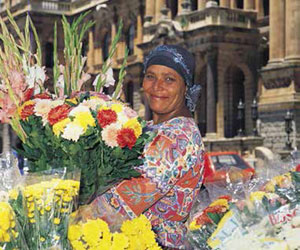 The Informal Traders Upliftment Project aims to identify, train, coach and mentor 1 000 informal traders in all nine provinces over the 18 months.
The Informal Traders Upliftment Project aims to identify, train, coach and mentor 1 000 informal traders in all nine provinces over the 18 months.
The project forms part of the National Informal Business Upliftment Strategy which was initially developed by the Department of Trade and Industry, but is now an initiative of the Department of Small Business Development and will be facilitated by the wholesale and retail sector education and training authority (Seta).
Minister of Small Business Development Lindiwe Zulu said the project aims to make the informal trade sector more competitive through skills development, bulk and collective buying and infrastructure support such as providing warehouses for storage and distribution.
She added that the department would also look at exploring partnerships between South African and foreign informal traders based in the country.
“Our local informal traders can benefit from the business experience, knowledge and skills of their foreign counterparts. I am confident that foreign traders will be willing to share their business experience,” said Zulu.
Minister Zulu said the department would also look to reduce bylaws and red tape and at plans to review policy to ensure market access and proper registration of businesses.
“I am determined to fast-track the implementation of the project as part of addressing the concerns and challenges that confront the informal sector,” she said.
Already, 18 informal traders were selected in the Alexandra township with the help of the Greater Alexandra Chamber of Commerce. The traders will be trained by the South West Gauteng College in attitudinal, business skills and retail operations. Mzwandile Mavulu, an informal trader selling fruit and also the KwaZulu-Natal provincial secretary of the African Cooperative for Hawkers and Informal Business (ACHIB), welcomes the support from the government for informal traders.
“We have never received any institutional support from government, despite approaching them for assistance on many occasions,” said Mavulu.
He said some of the challenges he and other members of his organisation face are access to finance, a lack of retail and business management and a lack of skills.
Mavulu said the organisation is in the process of forming an informal traders cooperative which would give them buying power.
“By pooling our resources and buying products in bulk we would be able to be more competitive in our pricing and able to compete with larger shops and businesses,” he added.
*Daniel Bugan is a writer at Small Business Connect
Unit to speed up payment to businesses
Unit to speed up payment to businesses JoyReprieve could be on the way for business owners who supply the government with goods and services, but struggle to get paid timeously.
This comes after cabinet approved the establishment of a special unit that will help national and provincial departments with making payments to businesses within 30 days of receiving an invoice.
The announcement was made by Minister of Planning, Monitoring and Evaluation Jeff Radebe recently.
Minister Radebe said that the unit, which would be set up within his department, would work in partnership with the National Treasury and the Department of Public Service and Administration.
He added that despite progress being made with paying suppliers on time, many departments still faced challenges. He added that a national hotline would be publicised that would be available to suppliers to log instances of delayed payment.
“This will be taken up with the relevant department and responses will be reported on,” said Minister Radebe.
Robotic invention to help in firefighting
Robotic invention to help in firefighting JoyYouth matters
Firefighters often put their lives at risk when they are called to put out fires.
 Two learners from Mbilwi Secondary School in Thohoyandou, Limpopo, have come up with an innovative way to deal with this challenge and possibly save lives.
Two learners from Mbilwi Secondary School in Thohoyandou, Limpopo, have come up with an innovative way to deal with this challenge and possibly save lives.
To increase interest in Physical Science and Mathematics, the school encourages learners to enter various science competitions. From the Expo for Young Scientists to the mathematics and science olympiads, learners always take part to increase their knowledge of the science world.
Caleb Kirui (Grade 12) and Fortune Mantsho (Grade 11) have designed a robotic firefighting machine that can be used by firefighters to put out dangerous blazes across the country.
“The aim of this project is to design a device that firefighters can use to gain access to fires without risking their lives.
We saw that many firefighters die in fires and we wanted to do something to help save their lives. “The idea came from the drones used by the US military. All you have to do is use a remote control to direct the device towards the fire and release a pipe connected to it. Water will splash out and put out the fire,” explained Mantsho.
The device is made out of a modified, remotecontrolled vehicle and has a hose-pipe dock built in. Aluminum foil and home-made fire resistant coating cover the device for additional heat resistance. In real life, the device would be the size of a big lawnmower and easily portable.
The two teenage inventors participated in the 2015 Expo for Young Scientists. The Eskom Expo arranges 32 regional science expos across the country, managed by volunteers, and one International Science Fair (ISF), where the most outstanding learners exhibit their research or investigative work.
Learners enter their scientific investigation into one of 25 categories, ranging from animal sciences to renewable energy. The best projects from each region are selected to attend the prestigious Eskom Expo for Young Scientists International Science Fair.
The Eskom Expo reaches over 1 000 schools and 100 000 learners nationally during the regional expos. Approximately 700 learners from the 32 regions are selected to exhibit at the ISF..
Eighteen-year-old Kirui said he is confident that their invention would stand the test of time.
“Though it is not 100 per cent at the moment, I’m hopeful that one day it will be and we will see it making a positive impact when it comes to helping firefighters.”
The two teenagers had encouraging words for other learners across the country.
“For you to succeed, you have to have passion for what you do and a love for it. Work hard, work smart and things will fall into place,” said Kirui.
Mantsho added that science plays an important role in life and if it was not for science, the world would be a poorer place.
Sailing off to their dreams
Sailing off to their dreams JoyYouth matters
Transnet will spend R7.7 billion on training to produce a pool of skilled individuals who can take the country’s economy forward.
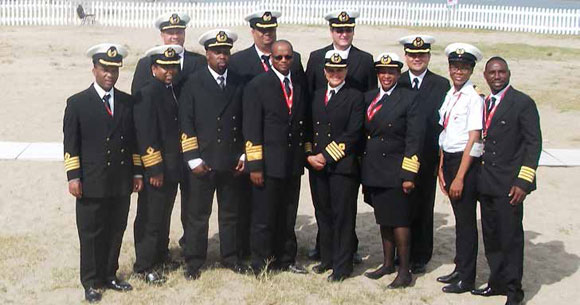 Speaking at the Maritime School of Excellence graduation ceremony held at the Durban Port recently, Transnet Acting CEO Siyabonga Gama said Transnet has spent about R2.5 billion in training over the past two years.
Speaking at the Maritime School of Excellence graduation ceremony held at the Durban Port recently, Transnet Acting CEO Siyabonga Gama said Transnet has spent about R2.5 billion in training over the past two years.
“This is intended to ensure an integrated approach to training delivery across Transnet, while benefiting from economies of scale through shared services - in areas such as human resources and procurement – at the same time,” he said.
The Maritime School of Excellence is a merger of the School of Ports and the School of Port of Operations and is the first of its kind in South Africa. The school is situated in Durban, with satellite campuses in Richards Bay, Cape Town and Port Elizabeth. It aims to address the shortage of technical skills in the maritime sector and specialises in marine operations and terminal operations, port management and engineering.
Maritime refers to any activity that happens in or around the sea.
The school’s Executive Head Herschel Maasdorp said it has produced over 100 graduates since its first enrolment in 2013 and that the first batch of 76 graduates completed their internationally recognised qualifications in 2014. This year’s graduation class stood at 115.
“These graduates have completed courses in various areas of port operations, including marine pilots, tug masters, chief engineers, engineering technicians, engineers, master port operators and operators (that offload ship-to-shore cranes). This year’s graduating class, of which over 90 per cent are black and 25 per cent female, are now employed at Transnet’s port operations throughout South Africa,” he said.
Maasdorp said they would increase the number of enrolments to over 130 this year.
“The basic requirement is a matric certificate, with maths and science, and a driver’s licence. We are not concerned about the marks, as we offer a one-month bridging programme to improve learners’ maths and science results,” he said.
A female marine pilot graduate, Nosipho Bokako, 30, told Vuk’uzenzele that working for Transnet is a dream come true.
“It was my dream to work as a marine pilot. After matric I studied Maritime Studies at Durban University of Technology for two years. When I finished I didn’t get a job, but I was lucky enough to get a cadetship for one-and-a-half years as type master. I worked for one year before my contract ended. I heard about Transnet’s learnership programme and applied and was lucky enough to be accepted,” she said.
Another graduate Senzo Shoba, 39, who is a machine operator, said working for Transnet has changed his life.
“When I heard about the learnership I was very reluctant to think that Transnet would consider my application because I am from a very disadvantage community in Nhlamvini, Ixopo. But here I am. Young people should grab opportunities like this because they are very rare to find,” he said.
Gama said the fact that 90 per cent of this year’s graduates are black and 25 per cent female shows that they are making progress.
“There were no women 10 years ago and we hope to have at least 50 per cent in the next five to 10 years,” Gama said.
Eight of this year’s graduates are from the Namibian Port Authority. This is in line with Transnet’s objective of establishing the Maritime School of Excellence as the leader in maritime training in Africa.
The next intake will be towards the end of the year and will be advertised in all regional newspapers.
For more information visit: www.transnet.net or call 031 361 2346.
Mandeni entrepreneur living his dream
Mandeni entrepreneur living his dream JoyWhen Mbongeni Msomi, the owner of Carwash Supreme, told his parents that he had resigned from his job as an import clerk at a shipping company to open a car wash business, they were not pleased.
 However, 31-year-old Msomi, from Mandeni outside Durban, was determined to pursue his dream of running his own business.
However, 31-year-old Msomi, from Mandeni outside Durban, was determined to pursue his dream of running his own business.
After resigning, Msomi approached the National Youth Development Agency (NYDA) in 2012 to apply for funding for his business. The NYDA gave him a grant to the value of R45 000 to buy equipment and waterless wash crystal products that the company would use to wash cars.
Since then, the business has grown to such an extent that he now runs three Carwash Supreme sites at the Pavilion Shopping Centre, uShaka Marine World and Wilsons Warf near the harbour in Durban. Carwash Supreme offers an eco-friendly service that uses only 500ml of water to wash one car.
“The products that we use provide the best carwash. We use an advanced spray on the car that lifts the dirt off. This allows the dirt to be wiped away with a special cloth. Our conditioner enhances and brings out the shine of the vehicle paintwork and removes stubborn grease, tar and surface scratches. This leaves the vehicle shining the Carwash Supreme way,” said Msomi.
Carwash Supreme employs 55 full-time and 26 casual youth employees.
“I am planning to increase employees to 100 as I will be opening another site in Pietermaritzburg before the end of the year,” he said.
S’busiso Mkhize, one of the employees at Carwash Supreme, said he enjoys his work because it has helped him to gain a lot of experience and he is able to provide for himself.
“The experience that I have gained is going to help me as I am planning to open my own carwash business one day and be like my boss,” he said.
Msomi’s advice to the youth is to work hard, persevere and be disciplined about how they manage their finances.
Liliesleaf farm: the farm that changed the course of our history
Liliesleaf farm: the farm that changed the course of our history Albert PuleBlurb: The Liliesleaf Farm Trust has kept the memory of South Africa’s past alive. A tour of the farm will make you relive the days of the struggle and the final days of Nelson Mandela and his generation.
South Africans are encouraged to celebrate their cultural traditions during heritage day and heritage month. South Africa’s cultural diversity has the power to bring citizens together and build a country that belongs to all who live in it.
South Africa has got a rich history and variety of heritage sites that captures the history of the country. From Robben Island, Mapungubwe Cultural Landscape, Cradle of Humankind, Cape Floral Region, Vredefort Dome and uKhahlamba Drakensberg Park, Richtersveld Isimangaliso wetland park the sites offers a diversity and abundance of cultural and natural values that encapsulates the value system of the country.
This year’s theme: ‘Reclaiming, restoring and celebrating our heritage” encourages different sectors to reconnect with the past in order to actively participate in shaping the future of the country.
This year marked the 50th commemoration of the Liliesleaf Farm raid by the apartheid police. During the commemoration, President Jacob Zuma said it’s our joint responsibility to tell the story of Liliesleaf.
“We all have a responsibility to ensure that the story of Liliesleaf and the Rivonia Trial is told in full for the benefit of current and future generations and that to ensure that the ideas born on this farm live forever”.
He added that consultations were under way to declare Liliesleaf Farm a heritage site.
The Liliesleaf Trust has turned the farm into a place of memory and reflection, where the past meets the present. The recent refurbishment of the farm raises awareness and illustrates the meaningful importance of liberation to the youth, especially the “born free” generation.
“We express our sincere gratitude to the Liliesleaf Trust and to all those who continue to work hard to ensure that this farm and the role it played in our struggle is never erased from the history of the evolution of our society” said President Zuma.
Recently, I took a tour to Liliesleaf Farm to learn more about its significance. As I approach the gate, nestled in the leafy suburb of Rivonia, I am overwhelmed by the sense of retracing the footsteps of giants of our struggle for freedom.
The 28 acre farm was used as a refuge and a secret meeting place by the leadership of the then banned African National Congress (ANC), the Communist Party.
The weather condition on the morning of my tour resembled the conditions on the fateful day of July 11, 1963, a day when the leadership of the ANC and SACP was arrested, changing the course of South Africa’s history, so says my tour guide Martha Moyo.
Her sentiments are echoed by the Chief Executive Officer of the Liliesleaf Trust Nicholas Wolpe. This only increases my sense of the historical magnitude of the visit.
On the day in question the police swooped on the farm looking for Walter Sisulu. They came disguised in a laundry van and arrested most of the top leadership of the struggle veterans.
“It’s a place of memory and legacy. It has been restored to tell a story of a very specific period in our liberation struggle,” says Wolpe.
Wolpe says the story of Lilieasleaf is told in a dynamic and interactive manner to appeal to the visitor. “We want to ensure that the events that occurred in that period are communicated in a manner that stimulates interest and encourages a journey of discovery and enlightenment.”
We first go to the main house where Arthur Goldreich and his family stayed. As we enter the main house, I am thrilled to be entering the same house that great thinkers that shaped the history of the country used to gather to plot how to overthrow the apartheid regime.
Moyo takes us to the “dining room” of the Goldreich’s where a huge interactive table with an arb is located in the middle of the room. The table displays a 3D interface consisting of videos, images, audio, and text depicting the history of communist party and the ANC.
From the main house, we walk to the kitchen, where Mandela was sitting, listening to a radio news bulletin that announced that Chief Albert Luthuli had won a Nobel Peace Prize in Norway. As we open the door, the music of the bulletin heard by Mandela plays and takes me back to that day where Luthuli gave that speech.
Our next stop is the thatch cottage where Walter Sisulu and his comrades were arrested as they were debating the feasibility of Operation Mayibuye. Inside the room, we watch the video of one of the police officers that was part of the raid explaining how they carried out the raid.
The last stop of our tour is the room used by Mandela disguised as David Motsamayi, a vegetable vendor. In the end, I feel like I have experienced an important part of South African history. Only in my case, there was no risk of arrest, only a friendly tour guide with a welcoming smile.
September being Tourism and Heritage Month, the public can visit the farm at a cost of between R60 and R150.
- Robben Island
- Cradle of Humankind and Taung Skull Site
- Mapungubwe Greater Mapungubwe Transfrontier Conservation Area
- Richtersveld
- uKhahlamba / Drakensberg Park
- Vredefort crater
- Cape Floral Region
- Isimangaliso wetland park
Making success of chicken
Making success of chicken Albert PuleWhen David Mphuti dropped out of university, his dreams of becoming a mechanical engineer went up in smoke. Life was tough for Mphuti without a qualification and no prospects of a job.
Mphuti had to go back home to do what he believes he was destined to do, farming. With help of the National Empowerment Fund (NEF) he runs a successful chicken feed manufacturing farm and supplies many small chicken broilers in and around Welkom.
He is also in negotiations with one of the biggest supermarkets (Pick n Pay) to supply them with chicken feeds and has great plans of expanding the business to offer training in the whole value chain of making money out of chicken.
According to Mphuti, the whole value chain includes, among others egg laying chickens, broilers, an abattoir, manufacturing chicken feeds and planting maize and sunflower to feed the chicken.
Mphuti’s love for farming goes back to when he was a little boy growing up in Qwa Qwa, he says farming was the only thing he knew and though things were difficult when he dropped out of varsity, at the back of his mind, he knew that farming was his way out of poverty.
“For me farming was a lifestyle, even when I was going through that difficult period at the back of my mind I knew that I will go back to farming.”
Mphuti and a few farmers around Welkom started Dihoai Farming Cooperative operating a small feed mill and broiler project on their farm. Since it was started, the cooperative has been producing feed mill for their own broiler projects and selling small quantities to the neighbouring chicken farms.
At the beginning, Mphuti says it was tough until he approached the NEF in 2011 for funding. The NEF funded him with a loan of R8.5 million payable within 10 years.
The funding was used for buying machinery, construction costs and working capital and he says so far he has been having a good relationship with the NEF.
“So far we have been working together without any problem and I’m grateful for the contribution they have made in this farm.”
He says small black farmers can succeed by working together especially in the same region. “The only way to succeed is to club together and assist each other where we can, like we are doing here, we are selling chicken feed at a lesser price to small and emerging farmers around Welkom.”
Dihoai also assists small local farmers with storage of their chicken, it sells feed at a lower price and it helps those who want to slaughter their chicken for the market.
They are currently leasing a 20 hectare farm next to Dihoai where they produce 2000 tons of maize that is able to manufacture feed to cater for 250 000 broilers and 250 000 layers.
Mphuti says the farm has big plans for the future and he is hopeful that in the next few years, Dohoai will be a success story.
Neighbors to benefit from policy
Neighbors to benefit from policy Albert PuleCommunities staying along the border of South Africa and its neighbouring countries will not be left out when government starts to distribute set-top-boxes.
About five million households with television sets have been earmarked for the distribution of the set-top-box.
“Cabinet further approved that government to provide free set-top-boxes to the five million poor TV-owning households. This shift is a reflection of government’s commitment to ensure that digital migration happens within the shortest time possible.”
Delivering the Budget Vote for the Department of Communications recently, Minister of Communications Faith Muthambi said discussions were already at an advanced stage between South African and its neighbors.
“We do these because we have prioritised South African communities alongside the borderline areas for the distribution of set-top-boxes in order to mitigate any potential frequency spectrum interferences.
“We anticipate to expedite the rollout of Set-Top-Boxes to be completed in the coming 18-24 months so that we can switch off analogue signal and begin to realise the benefits of digital dividend to allow for the rollout of Wireless Broadband Services. The progress on this programme so far marks another good story to tell.”
She added that agreements between neighbouring countries and South Africa were on the cards. “We are hard at work to conclude and sign Bilateral Engagements with our six neighbouring countries namely, Botswana, Zimbabwe, Namibia, Mozambique, Lesotho and Swaziland in order to minimise cross border radio frequency spectrum interference.”
The department will spend over R20 million on public awareness campaigns about the implementation of the broadcasting digital migration.
“Key messages have been developed. We will work with our local traditional leaders in implementing the digital migration awareness campaign.”
New system expected to improve access to justice
New system expected to improve access to justice JoyThe new case flow management system implemented by the Judiciary at different courts is expected to continue to have a positive impact of the clogged case roll.
Case flow management broadly entails the assignment and allocation of cases to a judicial officer at the earliest opportunity and the responsibility of that judicial officer to manage the flow of that case in an efficient and effective manner to ensure its speedy finalisation. According to convener of the new system and Supreme Court of Appeal (SCA) Judge Stevan Majiedt, the system has reduced the clogged case roll. “
A very good indication is the time parties have to wait to be assigned a trial date. In the larger divisions parties would have to wait in excess of 2 year to be assigned a trial date, and cases could take in excess of 3 years to be finalised due to postponements,” says Judge Majiedt. The new system is led by a Judicial Case Flow Management Committee (JCFMC) comprising of judges from all divisions of the High Court and of the Supreme Court of Appeal and the Constitutional Court. In 2012, a pilot project of the new system was implemented in three of the biggest court divisions in the country comprising of five pilots sites namely Gauteng (North and South) High Court, the Western Cape High Court and KwaZulu-Natal (Pietermaritzburg and Durban) High Court. Judge Majiedt says since the implementation of the pilot, the three divisions has seen a decrease in the waiting period of trials and a reduction of the cases on the roll, particularly at the Gauteng North High Court (Pretoria).
“In Gauteng, the waiting period for a trial date has been reduced from 1 year to 9 months at the start of the project the Pretoria Court had 224 921 outstanding cases on the civil roll, this has been reduced to 144 027 by February 2015. “In the Western Cape, once certified trial ready, a trial date can be allocated for the following term. Before the implementation of case flow management the waiting time for the allocation of a trial date was in excess of 2 years,” He added that other divisions have seen a decline in the waiting periods for trials. “All divisions have noted a marked decline in the time periods for the allocation of trial dates. In many of the smaller division, the waiting period is as low as 6 weeks.” Due to its success at the five pilot sites, the judiciary is planning to implement the system at lower courts. “Separate from the pilot project at the high courts, case flow management has been taking place at the lower court level, though not under the same directives as the pilot project.
The Chief Justice has expressed his wish to have the lower courts included in this project. “Once the drafting committee has finalised its work, the JCFMC will then, with the Magistrates’ Commission and the leadership of the magistracy investigate how best to implement Judicial Case Flow Management at the lower courts,” explained Judge Majiedt.
Recycling business grows from strength to strength
Recycling business grows from strength to strength JoySiyabonga Shange, a former printing technician, always dreamed of owning his own business.
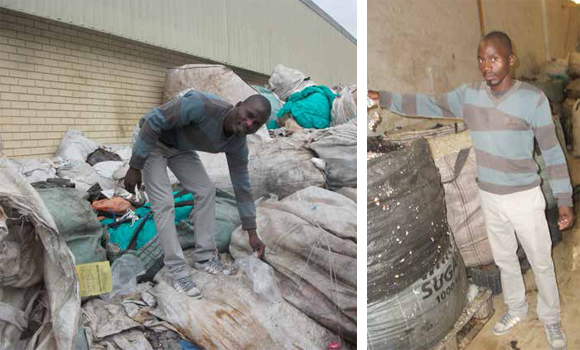 In 2010, he decided to take a leap of faith and resigned from his job to start his own industrial plastic recycling business. He registered his business under the name of Sbumeister Trading based in Pinetown, KwaZulu-Natal.
In 2010, he decided to take a leap of faith and resigned from his job to start his own industrial plastic recycling business. He registered his business under the name of Sbumeister Trading based in Pinetown, KwaZulu-Natal.
The company washes old plastic material and grinds it into small pieces using a specialised machine.
In the beginning, he did not have his own premises and had to use the washing plant in Cato Ridge owned by another company. In 2013, he heard about the National Youth Development Agency (NYDA) and approached it for funding. The agency gave him R30 500, which he used to refurbish a broken wash plant machine donated to him by one of his clients.
In 2014, the agency gave him another R50 000 to help with overhead costs. The company was also growing and the number of employees at the recycling plant increased from seven to 14 permanent employees and six casual workers.
In March this year, the Small Enterprise Finance Agency (Sefa) gave Shange and his mentor and business adviser Berry Smith, a former bank employee, R1.9 million in funding to buy a new wash plant machine and to move to new and bigger premises.
Sbumeister Trading cc operates around the clock, with a day and night shift.
“It becomes very stressful when there is load shedding because the production stops. But this challenge will be a thing of the past with the new wash plant machine as it uses both electricity and a generator.
“I purchase my material (old plastic) from the four biggest companies: Nampak, Interwaste, Enviroserve and eThekwini foods, which helps me a lot because I never run out of stock. The material is always there,” he said.
Nontsikelelo Bhengu, 32, a female machine operator at Sbumeister Trading cc said she enjoys her work because it helps her to provide for her mother and child.
“I enjoy my job. I don’t have any plans to move from this business. At home I make sure that I collect old plastics because I now know that it is not just dirty plastic but it is money. One of my future plans is to open my plastic recycling business as I have gained a lot of experience here,” she said.
Shange’s advice to the youth is to persevere and focus on their dreams.
“Challenges are there but if you are focused, you can overcome any challenge that comes your way,” he said.
NYDA Executive Chairperson Yershen Pillay said seeing how the lives of NYDA beneficiaries have changed through the NYDA Business Grant Programme in KwaZulu-Natal is inspiring for the agency.
“We encourage young aspiring entrepreneurs sitting at homes to come to our offices to enquire and get more information on what is on offer,” he said.
What the Valuer-General does
What the Valuer-General does Albert PuleIn 2012 Cabinet approved the establishment of the Office of the Valuer-General (OVG) aimed at assisting government to deal with among other issues the over pricing of land. In this edition, Vuk’uzenzele explains in detail what the office does.
What does the Office of the Valuer General does?
The basic role of the Office of the Valuer General is to act as a final authority on matters of land and property valuation where the government is a party or has an interest.
The office shall, in addition, provide specialist valuation services and 22 property market advice to government. The primary purpose for the Office is to create norms and standards for the determination of just and equitable compensation for land acquired for land reform and in the public interest, and to ensure their enforcement.
What powers does the OVG have?
The OVG shall have power to determine just and equitable compensation, or any other type of value, as the circumstances may require, in all cases where government has an interest, in accordance with recognised valuation methodology and professional valuation practice and standards applied in the country, and in line with relevant legislation and the constitution.
What is the relationship between the OVG and municipalities?
The OVG is a strategic intervention institution. It will not interfere in the normal functions of Departments and municipalities. These organs of government shall however conduct valuations using the norms and standards set by the OVG.
Can the OVG change decisions taken by local government and municipalities?
The OVG shall have power to override valuations done by all spheres of government where these are deemed not to be in line with set norms and standards.
Relationship between the OVG and other government departments.
The OVG shall report to the Minister of Rural Development and Land Reform who shall, in cooperation with Ministers with vested interests in land and property, exercise executive oversight and policy guidance.
10 specific functions of the OVG
- The setting of norms and standards for the determination of just and equitable compensation in line with the Constitution.
- The determination of just and equitable compensation when Government is acquiring land for land reform purposes, including by expropriation.
- The determination of just and equitable compensation for land restitution purposes.
- The determination of value where government (National, Provincial and Local) is required to buy or sell land and/or property.
- The determination of market rental value, where government is a lessee or lessor. The determination of just and equitable compensation for expropriation and land restitution purposes.
- The provision of specialist valuation and property-related advice to support government policy-making and operations.
- Undertaking of land and property market research and sales analyses to support strategic and operational decisions.
- The setting of guidelines, norms and standards required to validate the integrity of property market data.
- The creation and maintenance of a database of property market information
- The dissemination of property market information to the public by way of regular publications.
ATNS offers once in-a-lifetime opportunity
ATNS offers once in-a-lifetime opportunity JoyThe Air Traffic and Navigation Services (ATNS) is offering bursaries to students who want to pursue careers in air traffic management.
Percy Morokane of ATNS said successful candidates would be granted a oncein- a-lifetime opportunity to become air traffic control officers, assistant air traffic control officers and aeronautical information management officers.
He said the programme provides each bursar with an opportunity to study at the Aviation Training Academy in Bonaero Park, Ekurhuleni.
Requirements for prospective students:
- Matric certificate with a pass in the following subjects: Pure Maths (Level 4 / HG – D or SG - C or above) and English (Level 4 / HG – D or SG - C or above).
- South African citizen with a valid identity document.
- Candidate must be medically fit.
Skills and competencies:
- Good communication skills.
- Analytical skills.
- Problem solving skills.
- Teamwork and multi-tasking skills.
- Quick decision making skills.
- Emotional intelligence.
- Spatial reasoning ability to include visualisation of future situations.
- High self-esteem and confidence level.
Interested applicants must apply on-line at: www.atns.co.za or fax their applications to 011 607 1508/ 1548/ 1531 before 31 August 2015.
Jobs: Department of Social Development
Jobs: Department of Social Development JoyPROJECT MANAGER: SECTOR INFRASTRUCTURE SUPPORT
Ref No: 2015/15
(Three years fixed-term contract position)
Directorate: Business Process, Risk and Immovable Asset Management
TOTAL PACKAGE: R819 126 .00 per annum
Center: HSRC Building, Pretoria
This inclusive remuneration package consists of a basic salary, the states’ contribution to the Government Employees Pension Fund and a flexible portion that may be structured i.t.o. the applicable rules.
REQUIREMENTS:
An appropriate Degree/ National Diploma in Build environment field and advanced Project Management PLUS a minimum of 3 – 5 years (middle management) experience in managing projects. Knowledge of the relevant Public Service Legislation. Knowledge of the project management discipline and life cycle (Project Management Body of Knowledge, PRINCE2). Knowledge of project management techniques and tools. Knowledge of System Development Life Cycle. Knowledge of Construction industry.
Competencies needed:
Financial performance monitoring and evaluation. Strategic capability and leadership. Programme and project management. Financial Management. Policy analysis and development. Communication skills. Service delivery innovation. Problem-solving skills. People management and empowerment skills. Client orientation and customer focus. Stakeholder management. Presentation and facilitation. Planning and coordination. Time management. Risk management. Contract management. Conflict management. Capacity building. Analytical. Quality management. Leadership. Computer literacy.
Attributes:
Good interpersonal relations. Ability to work under pressure. Ability to work independently and as part of a team. Adaptability. Compliant. Independent thinker. Cost consciousness. Honesty and Integrity.
KEY RESPONSIBILITIES:
Design project management tools and methodologies, processes and standards. Manage and approve the feasibility assessment report studies. Develop prioritization model for determination of capital of capital projects. Provide technical direction towards the design and finalization of appropriate construction procurement and contracting strategies for the maintenance of DSD facilities. Conduct generic management function.
ENQUIRIES: Ms A Samaad Tel, (012) 312-7373
APPLICATIONS TO BE FORWARDED, QUOTING THE RELEVENT REFERENCE NUMBER TO:
The Director General, Department of Social Development, Private Bag X901, Pretoria, 0001. Physical Address: HSRC Building, 134 Pretorius Street , Pretoria.
FOR ATTENTION: Ms E de Waal
CLOSING DATE: 19 June 2015
PROJECT MANAGER: INFRASTRUCTURE PLANNING
Ref No: 2015/16
(Three years fixed-term contract position)
Directorate: Business Process, Risk and Immovable Asset Management
TOTAL PACKAGE: R819 126 .00 per annum
Center: HSRC Building, Pretoria
This inclusive remuneration package consists of a basic salary, the states’ contribution to the Government Employees Pension Fund and a flexible portion that may be structured i.t.o. the applicable rules.
REQUIREMENTS:
An appropriate Degree/ National Diploma in Build environment field and advanced Project Management PLUS a minimum of 3 – 5 years (middle management) experience in managing projects. Knowledge of the relevant Public Service Legislation. Knowledge of the project management discipline and life cycle (Project Management Body of Knowledge, PRINCE2). Knowledge of project management techniques and tools. Knowledge of System Development Life Cycle. Knowledge of Construction industry.
Competencies needed:
Financial performance monitoring and evaluation. Strategic capability and leadership. Programme and project management. Financial Management. Policy analysis and development. Communication skills. Service delivery innovation. Problem-solving skills. People management and empowerment skills. Client orientation and customer focus. Stakeholder management. Presentation and facilitation. Planning and coordination. Time management. Risk management. Contract management. Conflict management. Capacity building. Analytical. Quality management. Leadership. Computer literacy.
Attributes:
Good interpersonal relations. Ability to work under pressure. Ability to work independently and as part of a team. Adaptability. Compliant. Independent thinker. Cost consciousness. Honesty and Integrity.
KEY RESPONSIBILITIES:
Develop project scope and project plans in collaboration with provincial infrastructure managers. Manage the social infrastructure projects cycles and reporting. Develop policy documents, process maps, SOP and any related documentation to improve infrastructure planning. Provide technical technical direction for the developed and aligned accordingly. Develop norms and standards for facility designs. Manage the infrastructure asset system. Conduct generic management functions.
ENQUIRIES: Ms A Samaad Tel, (012) 312-7373
APPLICATIONS TO BE FORWARDED, QUOTING THE RELEVENT REFERENCE NUMBER TO:
The Director General, Department of Social Development, Private Bag X901, Pretoria, 0001. Physical Address: HSRC Building, 134 Pretorius Street , Pretoria.
FOR ATTENTION: Ms E de Waal
CLOSING DATE: 19 June 2015
DEPUTY DIRECTOR: MEDICAL CASE ASSESSMENT AND ADJUDICATION
Ref: 2015/13)
Directorate: Medical Case Assessment
TOTAL PACKAGE: R630 822 .00 per annum
Center: Harlequins Office Park, Groenkloof
This inclusive remuneration package consists of a basic salary, the states’ contribution to the Government Employees Pension Fund and a flexible portion that may be structured i.t.o. the applicable rules.
REQUIREMENTS: A MBChB Degree PLUS five (5) years professional experience in the medical field. Registration as medical practitioner with the HPCSA. Knowledge of the Public Service Legislation, Social Security Legislation and Medical Practices and Guidelines.
Competencies needed:
Communication (written and verbal) skills. Planning and organising skills. Problem-solving skills. Diagnostic and analytical skills. Project management skills. Computer literacy. Facilitation and presentation skills. Client orientation skills. People management skills. Policy development and analysis skills. Monitoring skills. Report writing skills. Interpersonal and liaison skills.
Attributes:
Ability to work under pressure. Ability to work in a team and independently. Innovative and creative. Assertiveness. Achievement orientated. Cost consciousness. Business ethics. Confidentiality.
KEY RESPONSIBILITIES:
Prepare files for medical assessment with recommendation to the Medical Tribunal Members. Develop, implement and review guidelines, norms and standards, forms and procedural documentation for adjudication in line with the Social Assistance Act. Conduct quality assurance and prepare feedback reports regarding social assistance appeals. Prepare periodic reports regarding Social Assistance appeals and analyse medical trends of appeals adjudicated and SASSA rejections/ reconsiderations. Coordinate, monitor and oversee referral process for second medical opinions. Assist with development, implementation, monitoring and evaluation of the compliance system to legislation, medical guidelines and policies. Monitor the effective functioning of the medical adjudication processes in provinces where applicable. Render generic core management functions.
ENQUIRIES: Dr J Olivier, Tel: 012 741 6877
APPLICATIONS TO BE FORWARDED, QUOTING THE RELEVENT REFERENCE NUMBER TO:
The Director General, Department of Social Development, Private Bag X901, Pretoria, 0001. Physical Address: HSRC Building, 134 Pretorius Street , Pretoria.
FOR ATTENTION: Ms E de Waal
CLOSING DATE: 26 June 2015
NOTE:
A curriculum vitae with a detailed description of duties, the names of two referees, certified copies of qualifications and identity document must accompany your signed application for employment (Z83). Shortlisted candidates for SMS posts will be required to undergo competence assessment. The successful candidate will sign an annual performance agreement, complete a financial disclosure form and also be required to undergo a security clearance. If the candidate is applying for an OSD post, certificates of service must be attached to the CV. No faxed or e-mailed applications will be considered. It is the applicant’s responsibility to have foreign qualifications evaluated by the South African Qualification Authority (SAQA). Failure to submit the requested documents will result in your application not being considered. Personnel suitability checks will be conducted on short listed candidates and the appointment is subject to positive outcomes of the checks. Correspondence will be limited to shortlisted candidates only. If you have not been contacted within three months after the closing date of this advertisement, please accept that your application was unsuccessful. “The Department of Social Development supports persons with disabilities”
 It is our intention to promote representivity (race, gender and disability) in the Public Service through the filling of this post and candidates whose transfer / promotion/ appointment will promote representivity will receive preference.
It is our intention to promote representivity (race, gender and disability) in the Public Service through the filling of this post and candidates whose transfer / promotion/ appointment will promote representivity will receive preference.
KZN invests in rural development
KZN invests in rural development JoyThe KwaZulu-Natal (KZN) Department of Co-operative Governance and Traditional Affairs (Cogta) spent more than R40 million developing Ixopo during the 2014/2015 financial year.
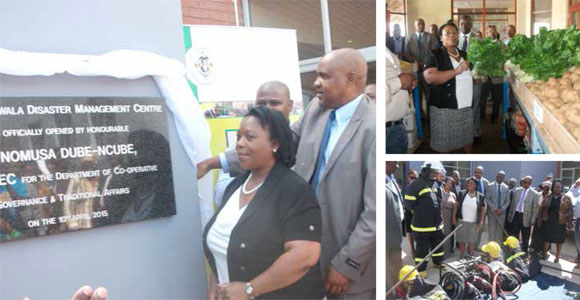 Ixopo, which falls under the Buhlebezwe Local Municipality, is one of the municipalities that benefited from the Small Town Rehabilitation Programme in the province. The main objective of the Small Town Rehabilitation Programme is to grow the economy in rural areas and create a safe and clean environment that will attract investment and promote growth in the area.
Ixopo, which falls under the Buhlebezwe Local Municipality, is one of the municipalities that benefited from the Small Town Rehabilitation Programme in the province. The main objective of the Small Town Rehabilitation Programme is to grow the economy in rural areas and create a safe and clean environment that will attract investment and promote growth in the area.
This was revealed by Cogta MEC Nomusa Dube at the official opening of the newly built taxi rank, disaster management centre and fresh produce farmers’ market recently.
The department spent R2 million on the taxi rank project, R4 million on the disaster management centre, R16 million on the fresh produce farmers’ market and R20 million on the electrification of Mahhehle, Mkhunya and Ofafa villages.
The programme created short-term jobs and other sustainable jobs could be created by the private sector investment that the programme is likely to attract.
“Our government is in the process of buying a portion of land, with a view to grow the economy in this area. We all have a role to play to keep the city clean and ensure that new businesses are opened,” said MEC Dube.
She added that the Buhlebezwe Municipality is one of the richest areas in terms of agriculture.
“Before the fresh produce market, farmers around here were supplying hospitals and correctional service centres in the area. Now their production will have to increase as they will be supplying the market as well,” said MEC Dube.
Mbali Mthembu, the manager at the fresh produce market, said the market gets customers from as far as Mzimkhulu and Durban.
“The market opens five days a week and every Wednesday we have market day specials. All our prices go down because we want to attract the locals to buy here, rather than going to big supermarkets,” she said.
Siyabonga Miya, 30, the owner of M&C cooperative, that produces vegetables such as spinach, pepper, butternut, tomatoes, dry beans and pumpkins, said that before the market opened they were only supplying two shops. “Both these shops take time to pay. The market is helping us get bridging capital while we wait for our payments,” said Miya.
Disaster Management Centre
MEC Dube said the opening of the disaster management centre in Buhlebezwe would minimise delays in responding to emergencies. “When there is a fire or road carnages people used to be stuck in their cars for hours, waiting for an ambulance or fire rescue team. Now all of these problems will be thing of the past, as the municipality has its own fully-equipped disaster centre,” MEC Dube said.
The establishment of the disaster management centre and the fresh produce market created more than 70 job opportunities for the youth in and around the area. The disaster management centre hired 51 youngsters, while the fresh produce market hired over 20.
Inkosi Phathisizwe Chiliza, of the Emadungeni Tribal Authority, said they were happy to see such developments in rural areas.
“This really shows that our government means business by developing rural areas,” said Chiliza.
dti funding boosts private enterprises
dti funding boosts private enterprises JoyThe Department of Trade and Industry (the dti) has helped over 3 000 private companies through its incentive schemes and other programmes.
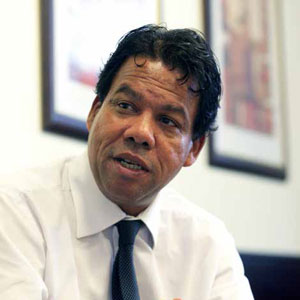 A total of 3 384 private sector enterprises across all provinces have received assistance to the tune of R13.6 billion during the 2013/14 financial year.
A total of 3 384 private sector enterprises across all provinces have received assistance to the tune of R13.6 billion during the 2013/14 financial year.
According to the Director-General of the dti, Lionel October, the aim of the incentive schemes is to help South African companies to compete on the global stage.
One of the incentive beneficiaries, La Ric Mal, a black-owned winemaking enterprise that benefitted from Export Marketing and Investment Assistance (EMIA) Scheme and Sector-Specific Assistance Scheme (SSAS), reported impressive job creation figures by their enterprise and an increase in export sales generated six months after attending a EMIA-funded international event to China.
Rudi van As of Film Africa, also a beneficiary, reported how benefiting from Film and Television Incentive and SSAS, gave his enterprise an opportunity to produce and shoot a documentary that is now running for its second season.
October was addressing the incentive beneficiaries and stakeholders at the Incentives Beneficiaries Profiling event in Cape Town.
“In a highly competitive global economy; creating an enabling environment for local and foreign investments is paramount to business and economic growth,” said October.
He added that performance reporting on the incentive programmes is important to the department’s service delivery strategy.
Over the past three years of the implementation of the Industrial Policy Action Plan (IPAP), the department’s incentive and other programmes have had a positive impact on corporate behaviour resulting in investment, growth and employment in sectors such as clothing and textiles, automotives, business process services, and film and television production.
“I am confident that our continued effort to bring about economic transformation is inclusive and contributing to employment creation,” said October.
Project beneficiaries included Eclipse Energy, Fabrinox, Film Africa, La Ric Mal, Baxter’s Auto, Solaire Direct and Spice Mecca.
Ekurhuleni Mayor woos international investors
Ekurhuleni Mayor woos international investors JoyInternational relations
The City of Ekurhuleni used the annual World Airport Cities Conference and Exhibition in China recently to attract additional investment from international investors.
 Executive Mayor Mondli Gungubele went to China to sell the city’s economic growth trajectory concept – the Aerotropolis – to investors at the three-day global event.
Executive Mayor Mondli Gungubele went to China to sell the city’s economic growth trajectory concept – the Aerotropolis – to investors at the three-day global event.
“Ekurhuleni has adopted a posture that is welcoming to strategic partnerships and private sector investments. We want the world to know that we are the preferred destination for investment in the Southern hemisphere.
“There is no doubt that the Aerotropolis concept is now mainstreamed in the city and has ignited a new wave of investments in and around the airport catchment area,” he said.
The Aerotropolis programme in Ekurhuleni intends to balance the distribution of economic activity between the nine affluent areas and the 17 townships of Ekurhuleni.
“This will be achieved through a systematic spatial and economic programme to enable the geographic spread. This way, our people will enjoy its benefits and improved quality of life from wherever they are without moving closer to the airport,” said Mayor Gungubele.
Ekurhuleni has over the years adopted the Aerotropolis concept as an economic growth trajectory that will create jobs for thousands of unemployed residents.
An Aerotropolis is an urban plan in which the layout, infrastructure, and economy is centered on an airport – in this case OR Tambo International Airport.
The Ekurhuleni Aerotropolis programme is a flagship programme which includes other flagships such as the Digital City, Integrated Rapid Public Transport Network, Beautification of Lakes and Dams, Urban Regeneration, Development of Township Economies and the Revitalisation of the Manufacturing Sector among others, to drive the radical economic development and transformation agenda of Ekurhuleni.
As part of the City’s Aerotropolis programme, there is a five-year Strategic Implementation Plan that has identified 10 economic clusters that will be prioritised for development.
The first wave of projects has already been started in some areas of the Aerotropolis. This includes:
- A R300 million PRASA Nerve Centre building next to Kaalfontein station in Kempton Park as part of the R4 billion tender station upgrade programme by PRASA.
- The Air Traffic and Navigation Services (SOC) is developing its head office and training academy in Isando, Kempton Park.
- The Peermont Group’s R320 million extension of Emperors Palace Casino and Resort.
Ekurhuleni has also recorded several interesting developments in and around the Aerotropolis Catchment Area. To date, approximately R789 million has been invested in a number of projects along Albertina Sisulu Corridor, creating at least 1 506 jobs.
“Judging from what has been happening around the OR Tambo International, it is clear that the Aerotropolis has taken off in a big way and we cannot look back now,” Mayor Gungubele said.
SA, Zimbabwe strengthen ties
SA, Zimbabwe strengthen ties JoyInternational relations
South Africa and Zimbabwe have strengthened their relationship by signing five agreements that will benefit both countries.
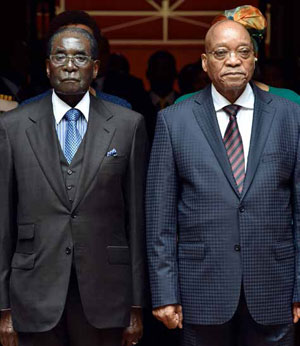 The agreements were signed during President Robert Mugabe’s state visit to South Africa, recently.
The agreements were signed during President Robert Mugabe’s state visit to South Africa, recently.
The two countries signed a Bi-National Commission (BNC) Agreement to be led by the two Heads of State, President Jacob Zuma and President Mugabe.
South Africa and Zimbabwe also signed a Memorandum of Understanding (MoU) on Diplomatic Consultations to ensure that there are regular diplomatic talks on issues such as strengthening bilateral relations, security and cooperation in Africa and other issues of mutual interest.
An Agreement on Cooperation on Water Resources Management was also signed and a Joint Water Commission was established for the two countries to work together in water resources planning, development and management in the spirit of mutual understanding and benefit.
An agreement regarding mutual assistance between customs administrations was also signed. This agreement will further cooperation towards the establishment of a one-stop border post.
South Africa and Zimbabwe also signed a MoU on Trade Cooperation.
President Zuma said Ministers from South Africa and Zimbabwe will work together to ensure that these and other agreements signed over the years are implemented.
Zimbabwe is among South Africa’s top three trading partners on the continent, while South Africa is one of the top investors in the Zimbabwean economy.
“Our desire is to have the economy, as well as trade, that favours both countries … that is what we are working towards,” said President Zuma.
As part of President Mugabe’s visit, a South Africa-Zimbabwe Business Forum was held to strengthen economic relations between the two countries.
The forum looked at untapped opportunities for deeper economic cooperation in the fields of mining, water, energy, infrastructure development, transport and information communication technologies, among others.
Strengthening socio-economic ties
President Mugabe said the state visit was a chance to improve socio-economic relations and that South Africa and Zimbabwe must work together and look at how the two countries can produce better value-added products.
“We are producing resources at primary level but also need to beneficiate them in an integrated manner that yields greater benefit,” said President Mugabe.
The two leaders also discussed global and multilateral issues especially the need for the reform of the United Nations Security Council ahead of the 70th anniversary of the United Nations this year.
“We want a United Nations in which there is participation by everybody and recognition of everybody as an equal member,” said President Mugabe.
Plans to classify online material
Plans to classify online material JoySport, arts and culture
The Film and Publications Board (FPB) is calling on all South Africans to have their say in the recently launched draft Online Regulatory Policy.
The policy, which is driven by the increase in internet access among South Africans, aims to find ways to regulate content on the Internet. Since the launch, the FPB has held national public consultation road shows, which started in April 2015, to allow members of the public to give inputs on the policy. The draft policy will force internet service providers and content generators to take more responsibility to ensure cyber safety, and help in stopping racism, hate speech and child pornography online.
“The industry distribution methods have also shifted significantly to online platforms resulting in convergence of distribution platforms and in large volumes of content being accessible globally on a 24-hour-basis,” said Chief Operation Officer of the FPB Sipho Risiba when launching the policy recently.
The policy, developed according to Section 4A of the Films and Publications Act, Act 61 of 1996, as amended intends to create and enhance cooperation between the FPB and the industry to ensure uniform classification, labelling, and compliance monitoring of digitally distributed content. Over the years, the FPB has focused on classifying physical content rather than content in the online space. This has resulted in children being exposed to unclassified or harmful content accessed through the internet and other mobile platforms.
Risiba said there was a decline in physical distribution of content and that South Africa was shifting to online more and more.
The FPB is responsible for regulating the creation, possession, and distribution of content in the country, which includes the online space. The FPB also regulates games and films by means of classification, imposes age restrictions, gives consumer advice, and makes the use of children in and the exposure of children to pornography punishable.
The board will not use the policy to classify all content being distributed online, but will work with companies that feature in the online space to come up with a coregulation model.
The public consultation process will end on 8 July 2015.
How to get involved? |
|||
|
Contributions needed for oral history collections
Contributions needed for oral history collections JoySport, arts and culture
Arts and Culture Deputy Minister Rejoice Mabudafhasi has called on South Africans to donate their oral history collections to national and provincial archives to help record the country’s history for future generations.
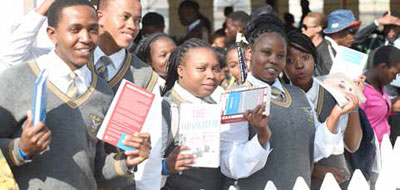 “There isn’t enough information collected on the Indigenous Knowledge System and on the histories of black people in general,” Deputy Minister Mabudafhasi said.
“There isn’t enough information collected on the Indigenous Knowledge System and on the histories of black people in general,” Deputy Minister Mabudafhasi said.
She added that it was sad that most of the younger generation couldn’t even recite their own clan names.
National archives look after and document government and historical heritage records.
Deputy Minister Mabudafhasi was speaking at the launch of National Archives Awareness Week in Limpopo recently. The awareness week took place under the theme “Archives our Living Past”.
“I assure you that your donations will be taken care of by our institutions. We have a rich history as a country which needs to be shared with the current and future generations,” she said.
Deputy Minister Mabudafhasi added that the National Archives had entered into an agreement with the Auditor-General of South Africa to ensure that all government departments comply with the laws of the National Archives Act and other relevant legislation, which makes reference to the importance of the proper records-keeping.
“We need to ensure that there is a records manager appointed in each department to instill good governance, efficiency and transparency.”
Deputy Minister Mabudafhasi said National Archives Awareness Week was aimed at promoting prominence to archival services and highlighting career paths available within the profession.
During the awareness week, learners in Limpopo got a chance to visit the provincial archives in Polokwane, Makwarela, Giyani and Lebowakgomo.
Deputy Minister Mabudafhasi encouraged the public to visit the archive buildings to get a better understanding and see archival functions and services.
Archivists from 13 African countries such as Congo Brazzaville, Botswana, Namibia, Ghana, Senegal, Sudan, Burundi, Egypt, Algeria, Tanzania, Western Sahara and Mozambique participated in archives week programme.
The Deputy Minister said South Africa needs to share ideas and expertise so that it can contribute to making the continent better.
“I am sure that our fellow African countries will take such opportunities to share their experiences, challenges and successes with our archivists and vice versa,” she said.
Outdoor gym for Mtubatuba
Outdoor gym for Mtubatuba JoySport, arts and culture
The community of Kwa- Msane in Mtubatuba, KwaZulu-Natal (KZN), now have access to a gym to help them live a healthy lifestyle.
 The KZN Department of Arts, Culture, Sport and Recreation handed over a fully equipped outdoor gym to the community recently.
The KZN Department of Arts, Culture, Sport and Recreation handed over a fully equipped outdoor gym to the community recently.
The gym equipment was handed over by MEC Ntombikayise Sibhidla-Saphetha as part of government’s programme to promote active and healthy lifestyles in communities.
The department is rolling out outdoor park gyms throughout the province to help people get fit, prevent lifestyle diseases and fight social ills.
The department has built a total of 33 outdoor gyms in the province at a cost of about R16 million over the past three years.
“These outdoor gym parks allow people to have access to gym facilities closer to their homes. We know that many people cannot afford to pay for commercial gyms and in some cases, it is not easy to use streets to run due to safety concerns,” said the MEC.
She explained that a community member had been trained to be an instructor, and would guide people with exercise programmes and ensure that the gym equipment is used safely.
“We encourage the community to look after the facility and protect it from being vandalised so that they can leave it for the next generation.
“The gym caters for the youth, adults and children who also have facilities to play,” said MEC Sibhidla-Saphetha.
Chairperson of the local sports confederation Celani Mbuyazi said the community welcomed the facility.
“The community has been looking for a facility of this nature and we thank the department for building this outdoor gym for us.
“We will form a committee that will ensure that the facility is looked after and we will engage with the local municipality to improve what we have here,” he said.
